#lost agent arc
Explore tagged Tumblr posts
Text
i love these little doodles at the end of some of the chapters during the lost agent arc
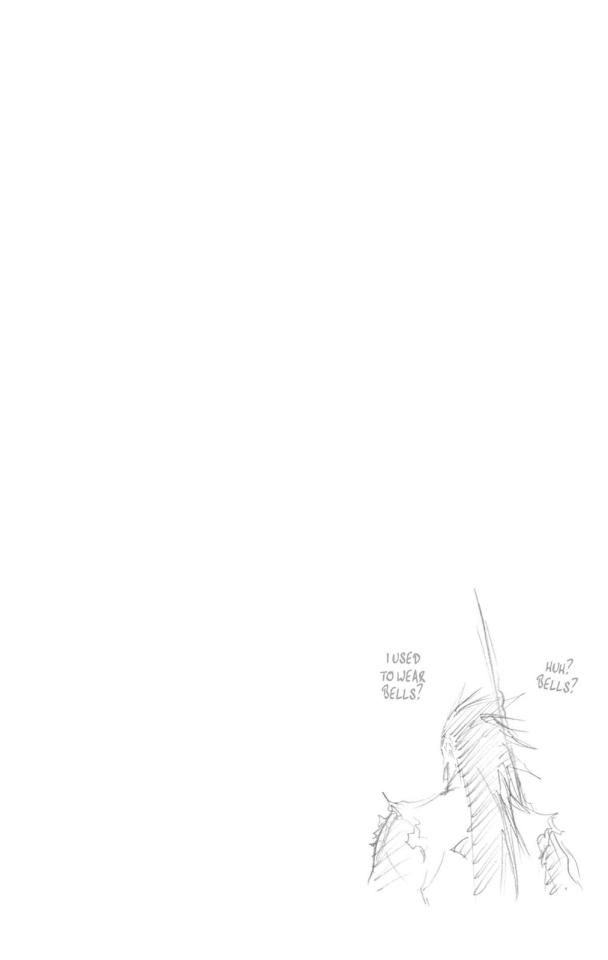
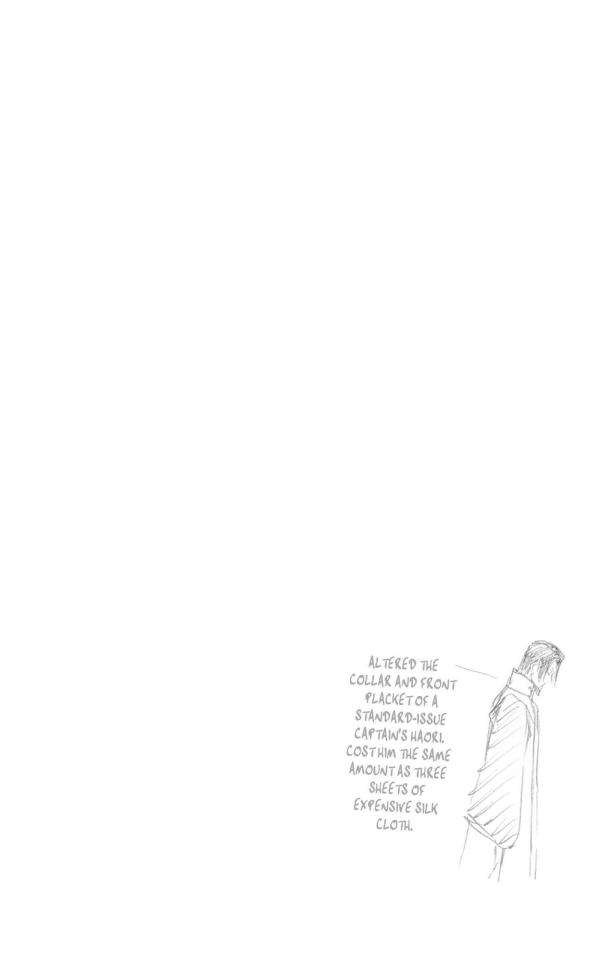
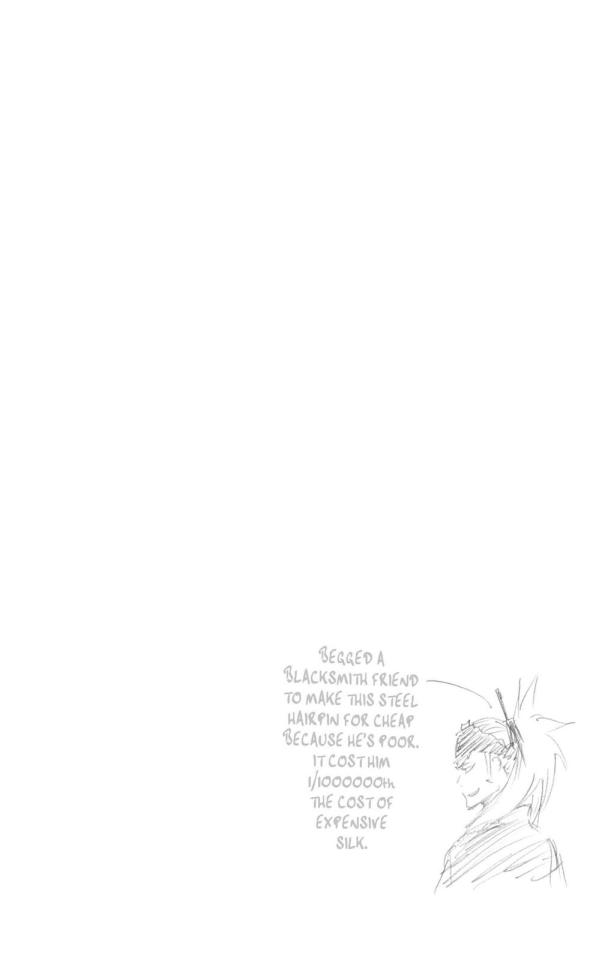


#bleach#bleach manga#kenpachi zaraki#byakuya kuchiki#renji abarai#toshiro hitsugaya#ikkaku madarame#lost agent arc
194 notes
·
View notes
Text
A great subversion of Bleach's storyline would have been if Isshin hadn't been involved in any way, in giving back Ichigo's powers...
Nothing from the World of the Living.
The entire plan had been made in Soul Society. Urahara would be involved, but we would have been absent from the main plot and we would have found out later on that he'd been in the Seireitei all this time, working with Mayuri. (I hate him, but I would be willing to throw him a bone on this one...)
Everyone would question where Isshin had been. Why had he not been involved in helping his son?
Then, when TYBW came around, we would find out that instead of that so-called love story between Isshin and Masaki, the Shiba Clan had actually always been shady as fuck, imprisoned and banned for valid reasons and Isshin himself wanted power and was in an alliance with the Quincy. (unbeknownst to Masaki)
He was not a awkward father who nonetheless loved his kids. He'd be power hungry, willing to sacrifice his first born into the crystal prison, to ascend to Squad Zero and somewhat rule over the Soul Society.
Squad Zero and Isshin manipulating and "allowing" Yhwach and the Sternritter's invasion?
Amazing.
Us being shown that Yhwach wasn't as powerful as he believed, the Almighty was just "fireworks"? Ichibei and Isshin being the actual villains since the beginning?
Byakuya, Rukia and Renji taking on Ichibei as Ichigo, Hitsugaya and Matsumoto had to fight Isshin?
Chef's kiss...
Ichigo having to cut ties permanently with his human side and the World of the Living after having to deal the final blow on his own father, would have been arrowing and emotional...
And I would have loved it.
#bleach#ichigo kurosaki#isshin shiba#squad zero#yhwach#kisuke urahara#tybw arc#lost agent arc#masaki kurosaki#byakuya kuchiki#rukia kuchiki#renji abarai#toshiro hitsugaya#rangiku matsumoto#random fic ideas#what could have been
84 notes
·
View notes
Text
Sorry to all of you DPxDC fans, but it's Bleach hours right now.
And I had a thought:
Fullbringers get their powers from leftover Hollow Reiatsu being left behind after a Hollow attacked their mother.
That's something we all know.
But most, chief among them Tite Kubo, seem to have forgotten that White was made specifically to be akin to a Viral Infection towards his targets. Ichigo, born a weird mishmash of everything, is part-Holow because of that.
Therefore, his Fullbring also IS infectious, because of the Hollow that made it possible, right?
Enter stage left...Kugo Ginjo, Fulbring Thief, and all around Bastard. Who's hearing up to take Ichigo's Fullbring for himself.
What if he got Infected by White's poison, which Ichigo almost certainly produces as part of his Hollow side?
Rapid resolution to the Lost Agent arc:
Ginjo steals Ichigo's Fullbring. Gloats about it, like the Machiavellian bastard that he fancies himself as, and goes to pay Ichigo back for all his help by killing him.
Except, now there's a nasty Hollowfying Infection digging it's claws into his soul.
Right in the middle of their headquarters. Where every single other Fullbringer is also stationed to stop Ichigo from tearing his head off before the process is finished.
And what are Fullbringers if now a source of extra Hollow Reiatsu, ripe for the taking for a young, newborn Menos?
Meanwhile, Shiro is cackling like mad in Ochigo's mind, watching this train wreck happen. It's poetic. Horrifyingly beautiful poetry in motion, of Ginjo being hoisted by his own petard.
Ichigo's friends, also known as a significant part of the Gotei 13, come in hoping to restore Ichigo's Shinigami powers just in time for him to fight off Ginjo...only to see a Hollow quickly growing into a Fucking Menos after it's morning snack, and Ichigo trying to play distraction while Uryu tries to turn it into a pin cushion.
@sunflowersandcherryblossoms Thoughts? Does that make sense?
23 notes
·
View notes
Note
If Twilights’s dad is a spy Then is he working for Westalis or Ostania?
Hey Anon and sorry for the delay! :3
Hmm, first of all, I don’t think his allegiance would be what matters the most, when in case this plot twist happens.
To recap a bit on the theory that Twilight's dad is still alive and a spy (first draft here), I think that, narratively speaking, the interest lies in:
Twilight's entire childhood, nay, life was based on a lie
A lie he's currently exactly reproducing by pretending to be Anya's dad (except that, unlike him, Anya knows her dad's a spy on a mission), which is why it'll need to be addressed by the plot eventually.
Additionally, and considering that this trauma from his childhood turned him into everything he didn’t want to be, I'd say facing this terrible truth (for once) is how he's going to come to the realization that he can't do to Yor and Anya what his dad did to him and his mom.
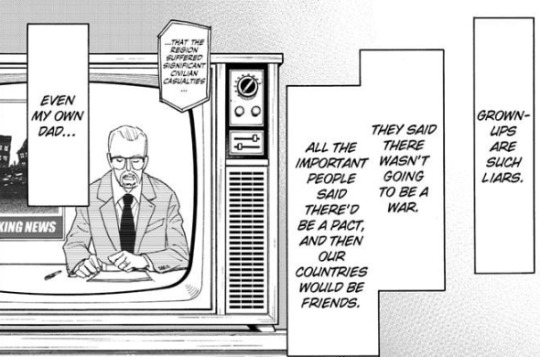
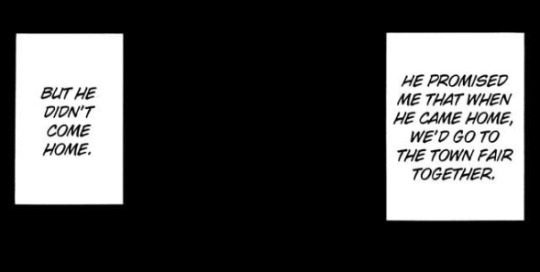
Otherwise, you know, "he's really just like his dad", a dad who possibly caused a terrorist attack or, at the very least, who took advantage of one to leave his wife and kid behind.
All "for his mission".
Twilight being recruited as a spy might be related to WISE knowing his dad is a spy
In that case, if his dad is also a spy working for Westalis, then WISE recruited Twilight because they bet he shares the same skills as his dad.
However, if his dad is a spy working for Ostania, then WISE recruited him for the same reason, except it was to use him as possible leverage/weapon against his own dad.


Either way, if WISE knew about Twilight's dad being a spy, then WISE will be held accountable for manipulating Twilight with lies. So I think, by the end of the story, Twilight will also come to realize this truth, because it's the only way to untangle the web of lies that now represents his life.
Also, Twilight realizing that WISE used him from the start would match with Yor being indoctrinated since childhood by the organization she also currently sides with.
And, while I have no doubt that eventually their family will prevail over old allegiances, I believe it will only be possible if both Twilight and Yor face the truth that they were totally used as pawns by the organizations they believed in, in order to free themselves from them.
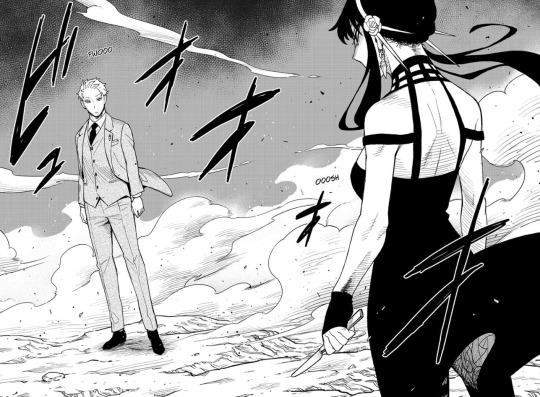
To finally answer your question (sorry for rambling): thematically since Twilight is Westalis' "greatest spy/asset", tbh it's likely that his dad is the Ostanian equivalent.
As for who he is, I'd say someone currently working for the SSS, which is how Twilight risks being discovered by them (if Garden doesn't sell him out first, for being Yor's fishy husband being interested in Donovan Desmond).
And considering the fact he must be an older man, with a light hair color, visible cheek bones and a slim nose, well, we don't have a lot of possible suspects in the cast...


Especially since, interestingly, the job of Yuri and his captain is to catch spies.
Lastly, if Yuri's captain is Twilight's spy dad, then he must have gotten that scar after leaving his wife and kid behind, say, maybe during that very same explosion/terrorist attack that happened in their hometown?
TL;DR my money is on Yuri's captain being Twilight's spy dad, because this has high comedic value, when we know how much Yuri dislikes Loid while his dad mentors him on the job. Though it's also quite ironically devastating considering that, in that case, Twilight literally impersonated his dad in ch14 when investigating Yor...

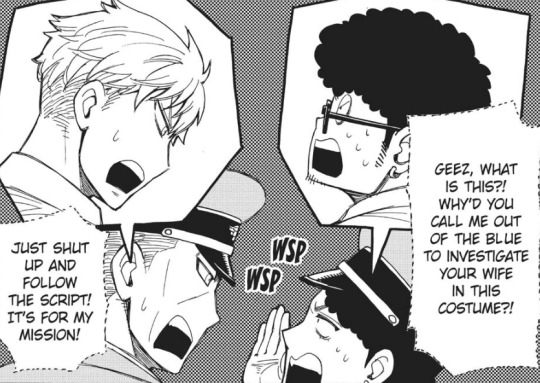
...implying he's slowly becoming exactly like his dad, a man he will despise once he finds out the truth. ://
Sorry for rambling, I hope it answers your question ! Have a good day ahead, Anon.
#spy x family#loid forger#yor forger#anya forger#yuri briar#twilight#garden#wise#sxf theory#anon#answers#my analysis#u want to know how i think the last arc will go well i'll tell u in the tags#imo Twilight gets discovered by the SSS after Garden realizes the truth about him but Yor who's sent after him is incapable of killing him#so he's arrested by the SSS while Garden beats up and restrains Yor for disobeying and that's when his dad reveals himself to him#having lost all will to live upon realizing his whole life was a lie from the start he's about to be shot to death by the SSS#but Yuri realizing that Yor has disappeared impersonates a SSS agent to save him then saying he can die after he helps Yuri finds Yor#Twilight realizing he doesn't want to be the same crap as his dad decides to go find and help Yor and Anya#meanwhile Anya was recovered by projet apple being funded by Donovan and her powers are used to plan a massive terrorist attack @ Westalis#Franky or Handler or Nightfall (or Henderson or Martha?) find out about Anya's fate but they get arrested by Garden which is where Yor is#Yor breaks free from Garden upon realizing that Anya's a little girl who's always been alone against the world and who needs her protection#somehow Damian will try to help Anya escape his dad's plan helped by Bond but fail & that's when Twilight and Yor will show up to save her#HAPPY ENDING AFTERWARDS (“we're the Forgers :)”) OK SENSEI?
159 notes
·
View notes
Text
I literally can not wait to show you guys Little shit Agent Walker TM in my comic. I write way ahead of my drawings so I have like 3-4 weeks worth of sketches before lineart and then 9-10 weeks worth of script and I crack myself up ngl. There’s this one drawing of Jay I did that I’m so proud of, I’m copying it into the first scene of him idc. I don’t think I posted it on here just because I liked it so much. I can’t stop thinking about my blorbos what can I say.
#Jaya prime empire au#Jaya prime empire au comic#ninjago#ninjago comic#also don’t forget merch drop soon#agent walker#I actually have a whole backstory I’m doing for him#like#how he lost his memory and what he calls himself and why#can’t wait to get to the prequel arc#ninjago dragons rising#ninjago dr spoilers
13 notes
·
View notes
Text
Nice colours you got there...

kuchiki byakuya i love you
#kuchiki byakuya#bleach#lost agent arc#the animators fucking hit my man with the bisexual flag after killing the enemy for Ichigo's sake...
28 notes
·
View notes
Text
zero with the helmet faceplate broken so it reveals just one of his eyes and spiderweb cracks all around it.........
#I am not in drawing mode right now so I can't make this happen for me but by GOD I wish someone would haha#campaign star wars#agent zero#evil campaign#I'm so sad we never got to see zero get to go completely ham in battle#the closest we have is the mandalore arc but he's clearly reeling a bit from his lil guy getting thrown off a roof in that one lol#that's his emotional support lil aged out boy king and without him he lost two arms in one night. rough times for zero#I simply think zero should get to go full beast mode and kill a bunch of people in cool ways audiotorially on-screen. as a treat!#a treat for him a treat for me a treat especially for blue there are no downsides here. except for the people he'd kill I guess#I love what we got but I mourn what we might have had (zero with his faceplate cracked in a metaphorically coherent and pleasing way#killing fools and looking cool doing it. imagine someone almost managing to kill blue and zero going To Town on them. imagine.)#steadfastly not looking at how many of my comfort characters have their eyes or faces habitually covered in some way#it quite simply means nothing and signifies nothing
4 notes
·
View notes
Text
What sort of villain are you quiz?

1 note
·
View note
Text
This continuity error was never explained and it's what, at first, made me think there must have been a two year span between the Lost Agent Arc and Thousand Year Blood War...



#hair doesn't grow like that in just two months...#two years? sure....#bleach#byakuya kuchiki#soul society arc#lost agent arc#tybw arc
22 notes
·
View notes
Text
My favorite part of seeing people get into bleach is when they reach the Lost Agent Arc and act all surprised at the stupid powers and nonsense plot and the way none of the characters act like theyve had any development.
Acting all betrayed going "What the hell, this sucks?!"
Comrade, Bleach has sucked the whole time. You just gotta ride the suck wave and when the flood has receded you can dig for cool rocks in the sand.
#the real reason nobody likes the lost agent arc is because the character designs are lame as hell#the arrancar arc was also stupid as fuck and had side characters acting like dipshit morons#BUT#the bad guys looked extremely cool#and the fights were good#unlike lost agent where only most of the fights were good#and none of the bad guys looked cool#bleach may be actually about the power friendship and the strenght of interpersonal bonds#but what its really about is violence and colors#anyway one of my buddies got to the la arc and they got opinions its actually awesome
1 note
·
View note
Text
ichigo is a good boy, and when he went to retrieve kūgo from the soul society my appreciation and love for him increased tenfold
1 note
·
View note
Text
mission accomplished
✎ Leon's a certified manwhore, really. You know that, but you can be worse than him. So what's the most that can happen in a hotel room with a reputedly flirtatious womanizer like Leon after an onerous mission? ID LEON SUPREMACY.
cw: getting it in a hotel room, cunnilingus, d in p aka mating press yay, creampie, size kink size kink size kink, protection? forgotten. fem! reader, he's just silly therefore beware of the corny lines, biting, MDNI

“You wanna get dinner when this is all over?”
You couldn’t say if it was worth nipping in the bud at that juncture, but this whole little odyssey with Leon definitely started with that very query. It wasn’t a figure of speech – you really had him down on his knees in a random hotel room.
The lavender air of the hotel room, the gunpowder-like whiff, and the notes of Old Spice emanating from the tender curve of Leon’s neck still wreak havoc on your brain after your shared kisses. Your legs buckle, and you’re in sackcloth and ashes, all thanks to wearing those mean machines – your Jimmy Choos. But you feel sexy within his reach, and you adore the vamp of your stilettos – the panorama of him sinking between your legs as he nudges you down onto the edge of the mattress.
“Panties off, pretty.” His singsong cadence is cajoling, of course; you get the gist of it.
“Demanding, are we?” You rebut, pixilated and all mawkish. Lifting your hips only slightly, you hitch up your legs and pull down the panties that have been eclipsing your love-starved pussy for hours.
With a sloppy thud, the only piece separating Leon from your lovely cunt thumps onto the linoleum floor.
“Well, now you know why I said nay to dessert at dinner.”
Such corny, coquettish platitudes only serve to draw a slumberish smile to your lips. You have no idea how men with such beautiful faces can be saddled with a palate full of sophomoric slapstick. But a dick is a dick, and something tells you that Leon won’t leave you empty-handed.
“Fuck...” You tilt your head, tracing a moony arc, and your chin is high, all the while splaying your hands over the fluffy, freshly laundered sheets.
How you got here – and how he’s now lost in the slick heat of your pussy – is a great mystery. (Well, not really. It’s a story about two horny agents renting a hotel room on the condition that they make it safely back from their mission in China) Still, you love the tender lips pressed against your plush, juicy slit.
Leon wouldn’t leave without a taste, even though the foreplay feels superfluous. After all, skipping foreplay is a felony. It’s a rule – no exceptions: a manwhore has to know how to eat his girl out. This is precisely why Leon Kennedy is notorious in the D.S.O. and the dominatrix scene – a beloved whore through and through.
So he puts you in his mouth and eats you ‘til his teeth rot.
He loves it when you pull his hair (such a slut!); he even honors you with groans that sizzle your ears in a pleasant way.
Right now, Leon’s priority is to gorge on you and perhaps make you cum more than once during the course of the night.
But what about himself? His pleasure?
Of course, by the time he pulls down the indigo jeans he’s wearing, he will already be drenched in thick globs of precum.
He has a couple of minutes to reflect on that issue, but in those enchanted split seconds, all he does is lap at the dripping amrita from your hole, flowing for his benefit.
“Too fucking sweet.”
His mouth, which has been yapping non-stop since he was assigned to the assignment alongside you, is apparently very well trained at the eating-pussy phenomenon – and he can’t help himself, clawing at your thighs, pulling you into his mouth.
You’re half too thunderstruck to even buck your hips closer.
Tongue sugar-coated, even more delish as he drifts on and on over your pussy. No matter how many times he says he’s a typical man for your average overnight, the lies are unfolded, and he gets all the more addicted.
“Leon. I’m–’m fuck.”
You’re so out of it that you’re babbling whatever pops into your head and out of your mouth. Insidious blues lock on you when you push your eyes open, expecting to see that he’s got it – that you’ve grasped the notion of his generosity.
“I know, sweetheart. I know,” comes between each of his licks, and you can’t muster the strength to hold your own fucking head.
His mouth heats up a beatific pulsation within you when he rises up to your face and puts his business on your lips. Kissing on a first date (if fucking can be excused as a reason for a first date?) is idiotically discouraged, but this man isn’t going to listen to such absurd dictates when he’s drunk on your essence.
And you’re more than up for it, so you sweetly reciprocate his kisses.
Thwip, thwip.
It grates on your ears, and you know what it is. Leon hastily tugs at his belt, wary of missing a second. Free yet? Ha – it’s not in the cards. His boxer briefs are still in the way for both of you.
“I wish men wore panties too,” you bitch up, purpling your pouting lip.
Leon freezes mid-motion. Is he processing the absurdity of your words, or just too high on scotch and pussy to simply give a reaction?
Or are you already the pot calling the kettle black?
The possibility of the former, however, is an assumption fraught with misconception when you pull down Leon’s boxers – because he’s already in the same boat, but with a hole in it. If the room had been bathed in those bludgeoning fluorescents instead of the hazy dim lights, you’d have seen that his boxers were more profusely soaked than your panties.
Viva the dim lights... or the fact that you don’t even care how wet his dick is.
“What?”
The anticipatory look he gives you can only signal that he would like you to soar onto the bed.
“Legs up, roll over.”
“Nope. Missionary is for sore losers,” you mumble it in a faux, patronizing tone.
You’re a fucking liar.
As nice as it sounds to track his face in missionary and stab your fingernails on his back – despite the fact that you broke two of them in the line of duty – you want to ride him more than anything else.
“Losers, huh?”
Leon effortlessly grabs your wrists and stamps you onto the bed. “Sleep with losers, and you’re as good as a loser. The apple doesn’t fall far from the tree, yeah?”
Your head, sunken into the pillow, floats slowly on lint clouds. Watching him from below is like setting foot for the first time on an unearthed planet made of exploded blues.
Fuck. You’re so high; he’s turned you into a slam poet.
He hoists each of your calves and hooks your legs over the frame of his shoulders, leaving your pussy bared – and the December cold seeping in makes your insides flutter. If it weren’t for his pelvis pressing against you, you could very well trip on your ass and break a pretty serious bone.
“Keep your legs like this.” He prelects you, very laconic.
You feel so giddy as the raw head of his cock, which he rubs in the palm of his hand, slithers and softens at your entrance as he works himself in with assiduous thrusts.
“Tight as hell,” you hear him croak, but you aren’t quite in the zone enough to pay it any mind. Your bleary eyes are only half-lidded – if at all – not fully opaque, allowing you to catch a glimpse of him over the nebula-like blurs over his visage beneath your batting eyelashes.
“Shit, baby, you can’t even take the fucking tip.” Leon’s whispers are eulogies to the lovely cunt he first got drunk on the tang of and will now drool over for its tightness. He gives a roll of his hips but never what you so desperately need – he harrows you so blatantly.
You barely lift your hips, humble and tentative, to meet his impish prodding – but his splayed hand on your ribcage forbids you from venturing further, from fucking yourself on his cock any deeper. The loss of levity on your face, the line of your eyebrows knitted in frustration, is absolutely delicious to behold for a cheeky asshole like Leon.
“Stop trying to fuck yourself and use your words, would you?”
For no apparent reason, his voice haunts you.
“Come on, girl. Get it out.” Leon whispers again, layering all the clouds of discord in your head one by one. Those humiliating clouds poof, pan, flake, and evaporate from your slightly ajar lips in a single cry.
“Leon. Please. Gulp. Please! Fuck me.”
Ouch.
These words will always conjure visions of shooting yourself with your own gun once the alcohol drains from your veins in the morning – especially after these foul entreaties.
This chain of events – in which Leon has pulled a rabbit out of the hat on a night already in his favor – is capped off with your fuck-me-please beggary. (Propaganda even.)
“You got it, beautiful.” He nuzzles you – metaphorically speaking – with a cloying coo, albeit while ardently clenching your hips. The purple shadows that will mark your skin for weeks are right in his wheelhouse.
The normal you would go like, “Oh no, I can’t be such a slut overnight – and for a man? Humor me, bitch.” You’d be taking the mickey out of yourself.
Leon, however, is just divine. He’s inside you, and he’s hard – a diamond in the rough.
The kisses you share are sporadic, wet, and perhaps absurdly romantic for such a ’trivial’ night.
In Leon’s mind, the blinking light bulb is a blaring alarm – the realization that something this good is manipulating a distorted reality hits him in the seconds when he’s already hammering away at your cervix – but without violence.
“Fuck.” The kiss breaks abruptly, like a tape rewinding inside both your heads.
“The condoms.” The thought hits Leon square in the head – but what’s the big deal? Your legs are up in the air (bless the yoga gods), just like that scene of the chick in heels getting knocked up by Patrick Bateman. But now, the guy twitching inside you is preaching condom.
“Leon.”
You’re on the last rung, and his lips are a saliva-laden mess, melded with the cherry tinge of your lipstick. You really should’ve dabbed it off or something, yet he looks stupidly delicious.
He blinks at you, owing it to you to correct his mistake immediately – filling you to the hilt with a lingering, deep-seated thrust.
“Leon!”
Your cry strikes him rapt, and he savors that sinful tightness around him. So needy – he relishes the feel of you squeezing his cock.
You sharply suck in a breath at the touch of his teeth as he bites a bruise into the delicate flesh beneath your throat. He’s drunk on you – drunk on the saccharine moans and whimpers spilling from your lips – and, to be honest, he’s been dreaming about this the whole time.
Men grow wiser as they age, but as Leon got older, he indulged in one-night stands, devoting himself to pretty, pretty women making love to him.
It’s bitter that you’re one of those women, yet you still want him to use you – use you so badly, so carelessly.
You don’t know how much longer your fuck-drunk head can keep up, but he knows all too well that you’re close. He pulls back slightly, releasing your ankles and reaching between your legs with his gun-wielding hand to work his thumb over the pearl of your clit. You're so desperate for his affection, and tonight, he feels sufficiently lavish not to deny you this dazzling bliss.
Your moans echo through the hotel room – high-pitched, frantic – the overstimulation nearly unbearable.
“It’s okay, let yourself go. Cum for me, pretty.” Leon’s gruff sighs ebb and flow as he brings you back from the abyss. His pace slows – then, so randomly, he brushes a languid thrust against that spongy spot inside you.
And you listen dully, your eyes nearly rolling out of their sockets – but you give him what he wants.
Everything is hectic, wet, extravagant – and that’s exactly why he keeps going. Forehead to forehead, you both wind up panting, but Leon still gets an A+ for looking good while he fucks you into this mess of a bed.
Your glazed eyes stay locked on the night-blue shades of his pupils in the darkness.
You both know what that gaze signifies.
Before you can say a word, Leon pulls his cock out of your slick, dripping pussy with the most obscenely wet sound.
Something inside you frantically pleads for him to stay inside you – what a loss. But Leon takes your hand in his.
He still needs you.
“You’ve got this. Go on. Make me cum.”
Give his cock three – maybe five – sloppy strokes, and he cums on your stomach.
Easy.
You slide your legs down – there’s no way you can hold them up any longer – and he groans when you let go of his softening cock from memory, as if discarding an object no longer of use to you.
Your legs dangle over the edge of the bed, and Leon closes his eyes – if only fleetingly – to soak in the moment, his cheek buried in the crook of your neck.
Too long or too short – you don’t know how much time has stretched by. You’re so wired, your brain feels melted and fucked. Chunks of it oozing out of your ears. It’s almost cozy.
Disgustingly so.
But all good things come to an end.
The night hums like a club beat still thrumming in your bones. You sprawl in the wreckage of silk sheets, watching Leon slip into his jeans.
When he’s done, he turns and flashes you the cheesiest wink in the world. Always shocking you how corny he can be. Just minutes ago, he was fucking you into this very mattress – spread-your-legs kinda shit, fucked-your-brains-out kinda shit.
“Man, this room stinks of sex.” Leon makes a wry face and cups the tip of his nose.
“Get your ass up and take a bath, or I’ll never set foot in here again.”
You can hardly lift a hand to shoo him away. Mentally, you can no longer shield yourself from his crank antics. He knows it all and lets out a long, amused sigh – frolicsome.
“Well, you’re a big girl. You’ll be fine.”
Before closing the suite door, he steals a quick glance at the digits of your phone number, scrawled on the palm of his hand – just to make sure they haven’t faded.
“I’ll give you a weekend wake-up call,” Leon promises and closes the door behind him.
Whump.
Mercifully, the next date is a shoo-in, but it only means enduring another endless evening – seconds stretching into minutes, minutes into hours – drowned in his blathering and off-color in-jokes.
Is it really worth it?
The answer, considering you still can’t bring yourself to get up and clean the drying cum off your stomach, can only be one thing. You might as well call Hunnigan and let her know you won’t be making it to work tomorrow.
#leon kennedy x reader#leon kennedy x fem reader#leon s kennedy#leon kennedy smut#leon kennedy x you#leon kennedy#resident evil infinite darkness
711 notes
·
View notes
Note
Maybe a Drew x fem famous reader, when Drew accidentally walks out of a store holding a drink he didn’t pay for.You: “DREW, YOU JUST STOLE THAT.” Drew panicking “I THOUGHT I BOUGHT IT.”Cue him running back inside, dramatically throwing cash at the cashier, and apologizing way too much.
𝐚𝐜𝐜𝐢𝐝𝐞𝐧𝐭𝐚𝐥 𝐜𝐫𝐢𝐦𝐢𝐧𝐚𝐥
pairing: drew starkey x famous!reader
summary: a peaceful coffee run takes an unexpected turn when drew, in all his distracted glory, accidentally walks out of a store with a drink he didn’t pay for. cue sheer panic, a dramatic redemption arc, and you trying not to laugh as your boyfriend over-apologizes to a very confused cashier.
warning(s): english is not my native language. fluff, drew being an adorable mess, secondhand embarrassment, and an excessive amount of apologizing.
au: like, reblog and feedback are much appreciated. discussion can be send through my ask box, please feel free to send in anything. ⭐️ taglist | tagging: @rubixgsworld @rafeyslamb @bisexualcvnt @tracymbcm @maybankslover @anamiad00msday @stuffyownswrld @httpsdrewstarkey @mileyraes @enjoymyloves @akobx @noobmazter69 @victwrvale @xoxohoneymoongirl @xoxosblogsblog @wearemadeofstardust0 @saviorcomplexrry @percysley @littlelamy @winniemoe @emberaurora @watercolorskyy @kravitzwhore
i actually kinda bored so it would be great if we talk, you can send me anything through here → 💌 (will reply later, i had to charge my phone now :0)

Your and Drew morning had started off perfectly.
You and Drew had just wrapped up a long press tour, and finally, a lazy day together was in order. Hoodies, sunglasses, and a quick coffee run, so simple, right?
Well… almost.
You held Drew’s hand as you both walked into the small coffee shop, a place that had become a quiet favorite of yours over the past few months. It wasn’t too crowded, the baristas were nice, and most importantly, they made the best iced vanilla lattes.
Drew was half-distracted, scrolling through his phone with his free hand, probably checking a text from his agent.
Meanwhile, you stepped up to the counter, ordering your usual and Drew’s preferred cold brew. He grinned at you, pocketing his phone and wrapping an arm around your shoulder while the barista rang you up.
The moment the drinks were placed on the counter, you thanked the barista, grabbed your cup, and turned to Drew, expecting him to do the same. Except—
He was already walking out the door.
With his drink.
That he did not pay for.
Your eyes widened as you called after him.
“DREW, YOU JUST STOLE THAT.”
Drew, mid-sip, froze in place.
His blue eyes widened in sheer horror as he turned to look at you, then at the store, then at the drink in his hand. You could practically hear the gears turning in his head.
“I THOUGHT I BOUGHT IT.”
You bit your lip to keep from laughing as he stood there, looking like a deer caught in headlights. The barista behind the counter blinked at him, half-amused, half-confused.
“Babe,” you whispered through your giggles, walking toward him.
“You didn’t even take out your wallet.”
Drew’s face turned a shade of pink you rarely saw.
“Oh my god. Oh. my god.”
His voice came out in panicked whispers before he turned on his heel and sprinted, actually sprinted back inside.
What happened next would be forever etched into your memory.
Drew dramatically dug into his pocket, pulled out a handful of bills, and threw them onto the counter.
“I AM SO SORRY,” he announced, as if he had just committed a grand felony.
“I SWEAR I DIDN’T MEAN TO—I WAS JUST—I GOT DISTRACTED AND—”
The barista, bless his soul, simply nodded.
“Happens all the time, dude.”
But Drew wasn’t done.
“I SWEAR I’M NOT A CRIMINAL.”
You lost it.
You actually doubled over laughing, tears pricking at your eyes as Drew continued his over-apologizing spree. The poor barista just gave him a thumbs-up, clearly unsure of what to do with the sixteen dollars Drew had thrown at him for a four-dollar drink.
“Baby,” you wheezed, stepping beside him.
“I think they forgive you.”
Drew exhaled dramatically, running a hand through his hair as if he had just survived a life-threatening event. He turned to you with a sheepish expression.
“I panicked.”
You wrapped an arm around his waist, grinning up at him.
“I noticed.”
He groaned, hiding his face in your hair.
“I can never come back here again.”
The barista, who was definitely going to tell this story later… cleared his throat.
“No worries, man. I’ll just put a ‘Wanted’ poster up with your face.”
You cackled as Drew shot him a look of pure betrayal.
“Bro, don’t do me like that.”
Still laughing, you tugged on Drew’s hoodie, pulling him toward the door.
“Come on, Bonnie, let’s go before you accidentally commit another crime.”
Drew huffed but followed you, his arm slung lazily around your shoulders as you walked back to the car. He glanced down at you, a lopsided smile playing on his lips.
“You’re never letting me live this down, are you?”
You smirked.
“Not a chance, Clyde.”
And with that, the legend of Drew Starkey: Accidental Criminal was born.
#drew starkey#drew starkey imagine#drew starkey imagines#drew starkey x y/n#drew starkey x you#drew starkey fanfiction#drew starkey fanfic#with drew#drew starkey x reader#drew x reader#drew starkey fluff#drew starkey one shot#drew starkey x actress!reader#drew starkey x female reader#drew starkey x oc#drew starkey x singer!reader#drew starkey x famous!reader#drew starkey blurb
363 notes
·
View notes
Text
Oh, just in passing: a couple of SPOCK'S WORLD notes
(from @magicalgirlcrazycatlady:
!!!!!!! AUDIOBOOK SPOCK'S WORLD!!!! EXISTS? READ BY THOSE TWO?????????
Yep. If you go over to, say, Ebay, you can usually find somebody selling the audiobook on cassette (and if you're very lucky, on CD).
It hasn't been reissued in decades, and I can't really be sure why. It may be that there are union-based (meaning SAG[-AFTRA]) issues with the way Nimoy and Takei were compensated for the original performances; so that if the audiobook was reissued in more modern media, the publisher would have to deal with the way union rules for such performances have changed. (Which might run into serious money.)
In any case, it's a shame it's not more readily available. Both of the gentlemen involved did a fabulous job. I've had the pleasure of telling George so, and I'm sad not to have been able to tell Nimoy the same. (sigh) Anyway, it was a pleasure and a privilege to be involved in the endeavor.
...Also, per @rightspocko:
#oh my god you did that in 2 weeks#and you rewrote it so quickly and it’s still superb!#i never would’ve guessed because it’s so well structured and well written
The rewrite went as well as it did (and frankly as well as it could have done, under the circumstances) because before I ever started work on that book, I'd written a comprehensive outline.
It's not widely understood, I think, that when you're writing for a big IP owner / licensor, it is impossible to sell them a new project without first writing an outline that makes plain what it'll contain. Pantsing—however much some writers may enjoy that mode of novel writing, however much some may feel it to be the superior mode—has no place in the licensed-universe sales process. No licensor is going to even agree in principle with your agent that you're going to be brought in to do an original novel, let alone write the contract to back up their intent, until you've submitted an outline that tells Corporate in considerable detail what they (and their stockholders) are going to be getting for their money.
In the case of Spock's World, this rule went double, perhaps triple—regardless of the success of my previous work for Trek and Pocket. Spock's World was going to be their very first ever hardcover Star Trek novel. The whole project was a gamble... and the corporate Powers that Be therefore needed to know exactly what I was going to be giving them. So I did what I usually do for a book of the projected length—an outline somewhere in the neighborhood of 20-25 single-spaced pages. (ETA: For the hell of it, I just spent half an hour or so digging around for it, and [at the virtual "bottom" of a storage hard drive] found the ancient .arc file in which it'd been packed away. The outline is dated March 3rd, 1988, and comes to about 22 single-spaced pages. ...Call it 8K words and change.)
The outline, as always, was the "road map" I'd drawn for where I was going, to avoid wasting time in possibly getting lost along the way. All the structural work and serious plotting was already complete in the outline... ready to have the prose racked up in it, as a bookshelf's built ready to house its books.
And that's why the result, despite the near-disaster, still looks okay. All I had to do* was write again what "lost material" I'd already written, with the outline to guide me, or prompt me, where my memory failed. To this day I feel strongly that the book was significantly better because of that second write-through, however enforced. So this whole process turned into kind of a blessing in disguise (despite my poor lower back's more or less constant screams of protest).
That outline was what saved my butt... as others would, in years to come, further down the line. Those interested in having their own butts saved when necessary, and their writing life generally made less stressy, can look over here and see the outlining "blueprint" I use. C. J. Cherryh put me onto it; and what Carolyn doesn't know about writing a well- and tightly-plotted SF novel, seriously doesn't matter.
...And now I'm going to go make some spaghetti sauce. :)
*"All I had to do." CAN I EVEN HEAR MYSELF. (helpless laughter) It was like climbing hand over hand out of hell. But at least I could always see the light at the top of the tunnel...
#Spock's World#writing for licensors#and oh yeah#outlining#facilis descensus Averno#sed revocare gradum#hic opus#hic labor est#:)
304 notes
·
View notes
Text
SV Mary Poppins-ish AU.
So lots of protagonists and antagonists and etc have tragic backstories. Turns out that this can present something of a logistical nightmare for systems in cases where the stories become "real", because there are many instances where an author overestimated how survivable certain angst-ridden circumstances actually were, and without some kind of intervention, a lot of characters actually don't make it anywhere near their intended power-up and revenge/villain/hero/etc arcs.
In cases where this is happening, the System deploys a special agent to go make sure that plot-crucial characters actually survive to the plot.
Enter Shen Yuan, case worker for tragic backstories. His job, basically, is to sweep in during the points of the backstory where the story isn't paying attention and provide actual care. Most of the time, the system ensures that his clients forget about him when he's no longer present, so he can't impact the plot or their character development. But that also means he gets to be as nice and supportive as he wants to be while he is there.
He hates it, though -- knowing that he has to leave his little charges behind to suffer, and that they'll all forget him, and that some of them will grow up and meet bad ends (because they're villains, or tragic heroes, or doomed mentors, or fridged love interests, or so on). However, he can't beat the system, so he just tries to compartmentalize it. Focus on the here-and-now, steadily accrue points, and get to where he can afford to buy a proper reincarnation.
He works in this fashion for a long time, although it's difficult to keep track of it when the System is constantly bouncing him from relevant backstory moments to pending non-canon catastrophes. Sometimes it's stories he knows, sometimes it's stories he doesn't, or is only peripherally aware of. The first time he arrives in PIDW, he doesn't even figure it out. Partly because it's not backstory info that actually made it into the novel, partly because he has by that point kind of stopped trying to figure out where he's going, and whether or not the cute little kid he's helping is going to get their limbs all chopped off someday.
He likes Xiao Jiu and Yue Qi, but given the sheer number of times he has to go save them from dying and try to comfort them in their misery, he doesn't foresee them meeting good ends.
And then there's Luo Binghe. Treating a baby for hypothermia, helping a lost little orphan reach a faraway mountain on his own, bringing him food and treating his wounds in the woodshed, whisking him away to brief (always so brief) magical escapes to just give his brain a chance to rest and recover from all the grief and struggle, even if he won't actually remember the reprieve. Shen Yuan can't pretend he doesn't know that Luo Binghe's story is going to take him to some rough places, can only console himself with the idea that he'll be able to intervene at the worst of times, and that in the end at least, Binghe will live.
At least, until Shen Yuan realizes who Binghe's scum shizun is after he accidentally crosses paths with Shen Qingqiu, and Xiao Jiu recognizes him. Remembers him.
Then he figures out just what exactly is going to happen, and who it is going to happen to, and suddenly all that compartmentalization fails him.
Nanny Shen goes rogue.
855 notes
·
View notes
Text
JASON TODD VS. DABI: WHY NOT ME?
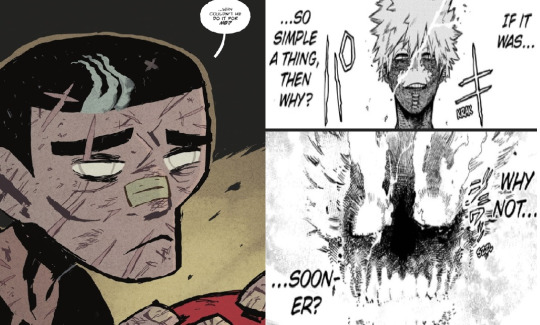
"You haven't been here long but you've seen him, right? The batman. The batman. He lives in darkness, to find the helpless and bring them into the light. So I have to wonder...why couldn't he do it for me?" The Boy Wonder: Issue #2
This is the story of the boy who didn't get saved. The story of a boy who really ought to have been saved. Of course, every victim deserves to be saved, but this boy was the son of a superhero. Can a hero who saves everyone, but fails to save his own son really be called a hero? As for the son, how does it feel to watch his father save complete strangers but let him fall to the wayside?
Jason Todd and Dabi are two characters with similar backstories and motives (so similar it's possible Dabi is outright based on Jason Todd) which are worthy of comparison. These are two tragic arcs which explore the conflict between a hero's responsibility to act as a father, and their responsibility to save people. As I said they are tragic because in both cases the hero fails, as a father, and a hero. However, I'm comparing the two because Jason Todd's story is a well written tragedy, and Toya's story is not.
If you were to write a story of my life, it would surely be a tragedy.
Aristotle's Poetics is the first attempt to define what Tragedy is, not as a story where sad things happen but a specific story structure. He outlines not only what makes tragedy, tragedy, but also what makes a good tragedy.
The Plot, then, is the first principle, and, as it were, the soul of a tragedy: Character holds the second place. A similar fact is seen in painting. The most beautiful colours, laid on confusedly, will not give as much pleasure as the chalk outline of a portrait. Thus Tragedy is the imitation of an action, and of the agents mainly with a view to the action.
I use this quote because the painting metaphor is a great way of explaining what I'm getting at, you can have a painting with the most wonderful colors, you can have a story with really good ideas like the Todoroki family plotline but if you don't use those colors correctly all you're going to end up with is a bad painting.
In poetics Aristotle clearly defines a tight well-structured plot as the first priority for effective tragedy, character as second.
Again, a beautiful object, whether it be a living organism or any whole composed of parts, must not only have an orderly arrangement of parts, but must also be of a certain magnitude; for beauty depends on magnitude and order. Hence a very small animal organism cannot be beautiful; for the view of it is confused, the object being seen in an almost imperceptible moment of time. Nor, again, can one of vast size be beautiful; for as the eye cannot take it all in at once, the unity and sense of the whole is lost for the spectator; as for instance if there were one a thousand miles long
To make sure you understand, it's vital in tragedy for all the pieces to fit together. Tragedy is a specific story format. Good tragedy uses the parts of a story well, but bad tragedy is sloppy and poorly put together. In tragedy, the whole has to be greater than the sum of its parts. The Todoroki Family are all good characters out of context, but the story could have enhanced their characters but detracted from them due to how poorly it is told. The fact that a lot of MHA fans are in love with the Todoroki family out of the context of the story, but also have constant complaints for how Horikoshi handles their plotlines is, in my opinion, very telling.
What Aristotle goes on to posit is the best tragedies do not come about by accident, but rather by the direct actions of the characters.
But again, Tragedy is an imitation not only of a complete action, but of events inspiring fear or pity. Such an effect is best produced when the events come on us by surprise; and the effect is heightened when, at the same time, they follow as cause and effect. The tragic wonder will thee be greater than if they happened of themselves or by accident; for even coincidences are most striking when they have an air of design.
Therefore Tragedies require consequentialism, like Newton's Third Law, every action will have an equal and opposite reaction. To simplify a good tragedy arises from the consequences of the character's actions (or inaction). The most basic form is that the hero of the story will have a tragic flaw that they fail to improve upon in time and then leads to their destruction. In essence, tragedy is where the hero fails. Not only does the hero fail, but the hero loses, and that irreversible loss is what defines tragedy. Medea slays her own children, Oedipus rips his own eyes off and deserts his kingdom, Creon Antigone is buried alive and Creon's son, her fiancee, commits suicide.
These events share two things in common, they are irreversible (hence why they feel like good endings), and two they evoke catharsis. Aristotle defines the goal of tragedy to evoke terror and pity. We feel alongside these heroes, Medea was abandoned by the husband Jason who she left her home and slaughtered her own brother for, Oedipus did all of his crimes unwittingly and is a victim of fate, Antigone was doing the right thing by burying her brother so his soul could pass on to the afterlife.
There's all different sorts of tragedies, Hamliet explores more here. I'd say UTRH and Hellish Todoroki Family are tragedies centered around grief.
Tragedy works on extreme emotions, and extreme hard-hitting consequences to the hero's failures. The worst thing a tragedy can be is boring.
The Tragic Hero
Now that I'm done lecturing you let's actually talk about both My Hero Academia and Batman like I promised. Both of these stories don't actually feature the central victim as their protagonist, and that is a feature not a flaw.
Rather, the story we are being told is that of a tragic hero, failing to save a tragic victim because of their own personal flaws.
These flaws are called (hamartia) or "error in judgement". A hero, being called a hero of a story is often unaware of his flaws which is central to what makes them unable to fix those flaws in time. That flaw can later lead to a moral failing, such as Othello's jealousy, initially jealousy is an understandable emotion, but then it leads to him trusting Iago over his own wife and killing his wife in a rage.
Most importantly, the hero’s suffering and its far-reaching reverberations are far out of proportion to his flaw.
Let's begin with talking of the heroes and their flaws, Batman and Endeavor. My main reason for comparing these two is in these specific stories they have the same flaw, inability to move past their personal guilt towards their son, and the same conflict the duty of a father versus the duty of a hero.
However, Batman functions as a tragic hero, and Enji does not. The summary of their conflict is right here in these two panels.
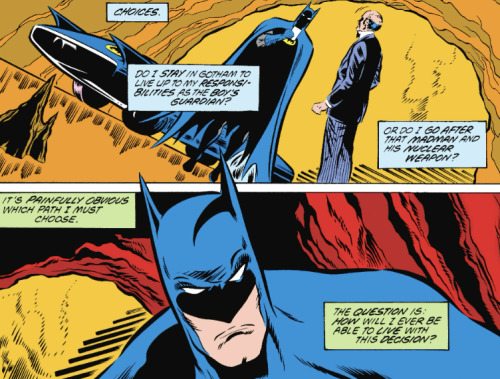
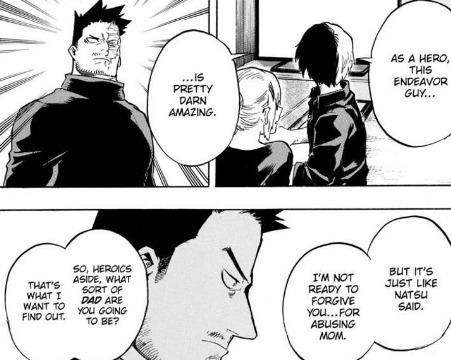
A parent is required to place their children above everything else, because they are the ones responsible for bringing that child into the world. Bruce Wayne made the decision to adopt Jason. Enji made the decision to have children, however with Enji you have the added insidious motivation of he only wanted to make designer babies and just didn't care for the ones who didn't turn out right.
Bruce attempts to do both, to act as a father for Jason and also a crime fighter as batman but he can't do both. This comes to a head in Death of the Family when Jason is having serious trouble because of his lack of a strong parental figure, and Bruce knowing that Jason is in trouble chooses still to go off and fight crime instead of staying with him. The choice to place crimefighting over the child they chose to take responsibility for has the unintended consequence of getting that child killed.
Whereas Enji makes the same choice over and over again, ignoring Toya's clear troubles at the fact his father no longer spends time with him and choosing to run away to the world of heroes because he doesn't want to face the fact that his actions are severely hurting his son. Bruce's motivations are more sympathetic admittedly he wasn't actively practicing eugenics, but the choice is the same and the consequences are the same.
Both Bruce and Enji are forced to bear witness to the deaths of their children when they are not there, specifically because they made a choice to be a hero instead of staying by their child's side. A situation directly caused by their choice to be a hero over a father, and a situation that would have been avoided if they had stayed with their child in their time of need. Jason runs off when Batman tells him to stay and gets kidnapped by the Joker, if Enji had been on Sekoto peak that day Toya would never have accidentally lost control of his fire.
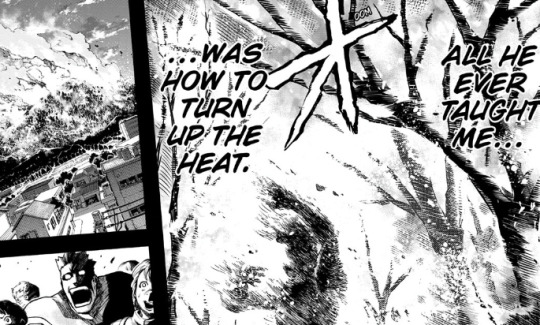
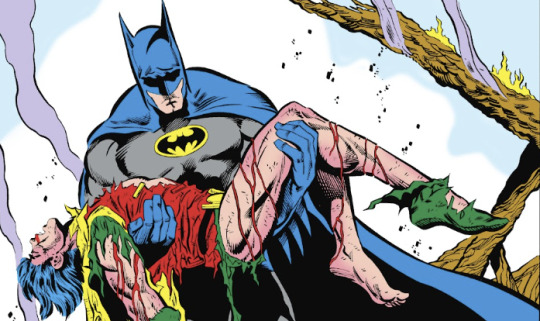
This is just the backstory however, the main event that kickstart this plot is the unexpected return from the dead of both Jason and Dabi. Each story follows the same plot beats. A new villain appears to challenge Endeavor / Batman. The villain reveals themselves as their dead son. Both Endeavor / Batman are given a chance to try reaching out to their sons, but they choose not to.
Then even though they are given a second chance with a miracle of a dead son coming back to them, they choose the exact same thing they chose before, being a hero and because of that the tragedy repeats itself. For both of them they are unable to save their son again, and the son goes through a second death. History repeats itself, the lesson isn't learned.
Their fatal flaw is their guilt. This is a story about grief and mourning after all, a son who is died, buried, but never grieved properly, never mourned, an open wound on the father suddenly coming back. The inability of each to process their grief blinds them from seeing the fact the son has come back, and they have a second chance.
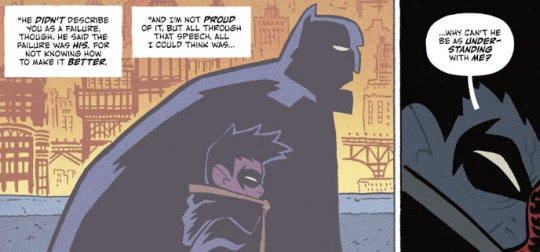
Toya has internalized he is a failure, because Enji literally called him that. Jason believes that Batman thinks he is a failure. In both cases the father is the one who failed, Bruce at least acknowledges this but cannot communicate it in any way shape or form.
This guilt and responsibility both Enji and Bruce feel causes them to self-sabotage. They no longer have the confidence they are in the right (they no longer feel like heroes because they have failed to be heroes to their own son).
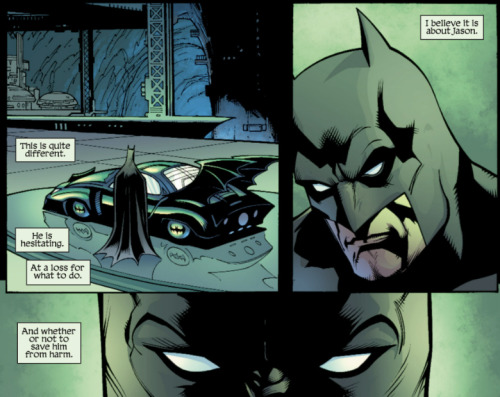
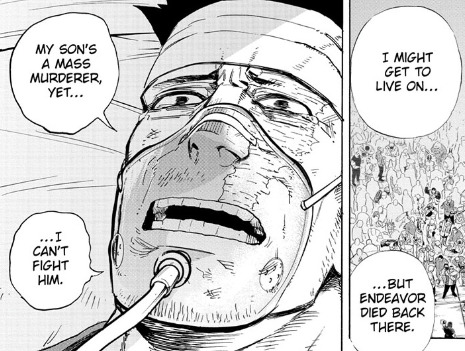
You can also add the layer of complication that since both men chose to be heroes in the past, they do not know how to handle the situation as a father now that they're being challenged to step up as one. Unfortunately, they are not the fathers that stepped up.
The reason their grief becomes a flaw is because they put their grief over their victims. . Each man is aware too much of their own failure, and while they should feel guilty they make the classic mistake of placing their own guilt over the feelings of the victim. The guilt they feel for causing the death and the genuine grief of losing a son is given priority over Jason and Dabi who you know... actually died.
An overwhelming grief and guilt is understandable because grief is a messy and human emotion, losing a child is an unimaginable tragedy that should never be inflicted on anyone.
Yet at the same time both Dabi and Jason are grieving to. This paradox that Batman only thinks of his own grief at losing a son and never stops to think about how Jason must feel leads to one of the best lines in Under the Red Hood.
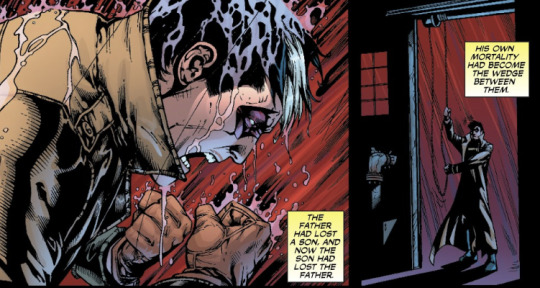
"The father had lost a son, and now the son had lost a father."
Batman's guilt is so strong over being the cause of Jason's suffering, that the suffering of the victim himself is ignored. To be fair to My Hero Academia, the Todorokis say a similar line to Enji.
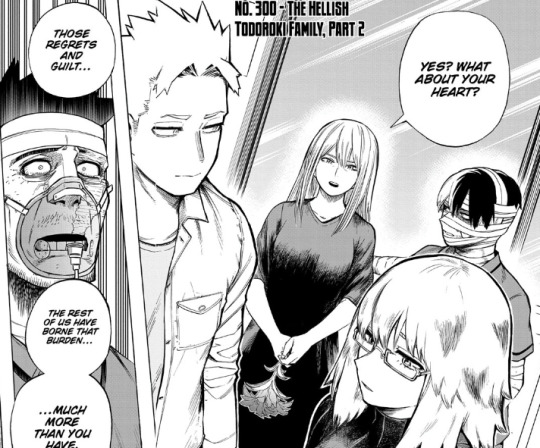
However, this is where I begin to get into the difference between ideas and execution. Tragedies are stories of actions and logical consequences, every action has an equal and opposite reaction in Under the Red Hood. Batman is punished for the choices he makes, the choices he doesn't make, and the choices he fails to make in time.
The Todoroki plotline features almost none of its character making any choices of substance, and because of that the plotline says the right things over and over again, but it all comes off as tell don't show.
I'm going to quote @codenamesazanka's post right here a couple of times because they describe the complete failure of the Todoroki plotline to show us a reason why we should be feeling things for the characters artfully.
We've heard Enji say this before - I'm sorry, I intend to atone. It's indeed the right thing to say, it's exactly what he should be saying and acting. Natsuo is declaring no contact - That's fine, I'm sorry, I accept this as part of my atonement and will continue. Touya calls him a coward - That's fine, I'm sorry, I accept this as part of my atonement and will continue. The public hates him - That's fine, I'm sorry, I accept this as part of my atonement and will continue. But you can only hear this so many times before you want to snap and beat the character, the story, the writing over the head with Enji's wheelchair. Why is that? He's behaving exactly as he should, and yet...
The reason why it fails to evoke strong feelings is because of what we'd called "narrative dissonance." The actions of Bruce and Enji are the same, they both neglect to do anything, make any real attempts to reach out to their victims because they're paralyzed by guilt.
However, we are told that they have entirely different arcs. Bruce's arc is a tragic fall. He's failing as a hero. While we are being told that Enji is experiencing an arc of atonement. Enji is supposed to be improving himself, and Bruce is supposed to be experiencing negative character development but they both do the exact same thing in story. Bruce neglects Jason, we are told by the story, by the characters in the story that Bruce is failing Jason. Enji does nothing in time to actually atone for Toya or try to help him, yet, we are told again, and again, and again, and again, and again, and again that Enji is atoning with nothing substantive to show us this is the case.
To show what I meant instead of telling this scene is in chapter 252.
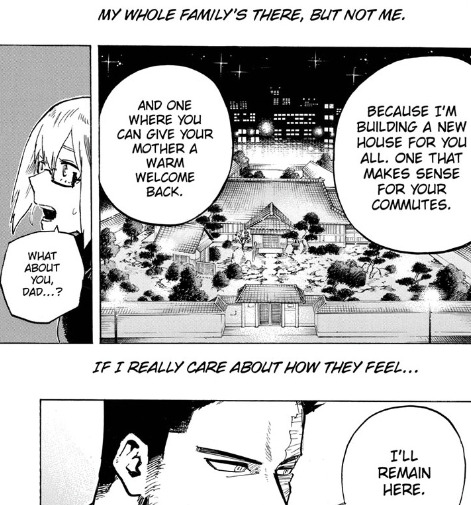
This scene is the ending point in chapter in chapter #426.
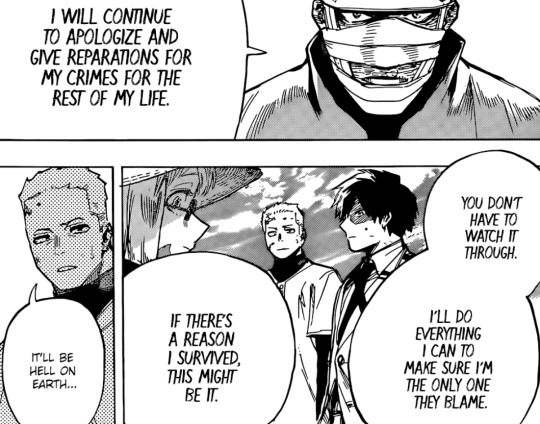
It's just him repeating the exact same sentiment and yet in a more than 150+ chapter gap, Enji never made any action to show he was now placing his family first. Enji didn't say anything to Dabi when he revealed himself as Toya. Enji didn't look for Toya in the months before the final war arc. Enji literally appeared on live TV in a broadcast that Toya was watching and said the very selfish "Watch Me" atone for the crime of creating Toya instead of literally talking about Toya or too Toya. Well, that would have rocked the boat too much... THAT IS LITERALLY THE POINT. Enji had to somehow break from tradition or make some significant sacrifice onscreen to his social standing to show that he's willing to put his family first. Enji decides to go along with Hawks decision to not face Toya head on, making the decision to be the hero for the final time which directly causes Toya to get up after Shoto brings him down non-lethally and make one last attempt to suicide bomb for his father's inaction.
Bruce does nothing for a long time in Under the Red Hood. He ignores his initial instinct that Jason came back and instead makes a long investigation on whether or not someone can come back from the dead in order to distract himself. When Jason takes the mask off, Batman already knew but was pretending otherwise because he didn't want to face the reality.
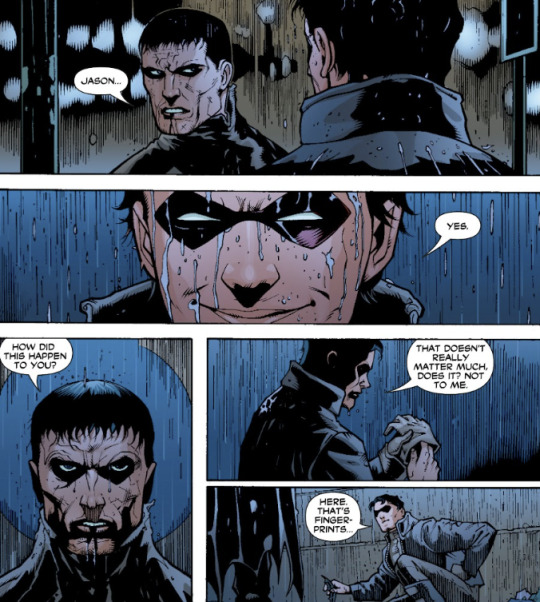
Even when Jason takes his mask off, Bruce still takes on the "I need to investigate this" angle even though Jason calls him out that deep down he already knows it's the truth. This of course foreshadows Bruce's underlying flaw, he doesn't want to face Jason head on because he feels too much grief about what happened to Jason and his guilt is more important than Jason's own grief. Just as the father has lost the son, the son has lost the father.
What follows is several chapters of Batman fighting crime as usual and making no attempts to directly search for Jason. They cross paths a few times but when they do Bruce doesn't follow. In fact, Bruce only shows up when Jason sends Bruce a sample of the joker's hair and Bruce knows that the Joker has kidnapped him out of Arkham. Bruce almost lets Jason get killed by Black Mask because he doesn't know whether to stop Jason or save him yet again, and then they have their final showdown where Jason has kidnapped the joker to demand Bruce kill him, and Bruce finally attempts to talk him down.
Out of context it sounds like I'm describing the same plotline, to the point where if you haven't read either, it looks like I'm complaining baselessly. Why is one hero doing nothing until it's too late good, and the other bad? The difference is of course context, or rather framing. Bruce's actions are called out by the people around him (Dick, Jason, Alfred) as him handling the situation wrong. Whereas both Enji's internal monologue and other characters say that he is doing his best to atone for his actions and deserves a chance, but the events we are shown in story are the exact opposite.
Here's another example to SHOW my point. Here's Dabi with my special, hardcover edition of under the Red Hood.
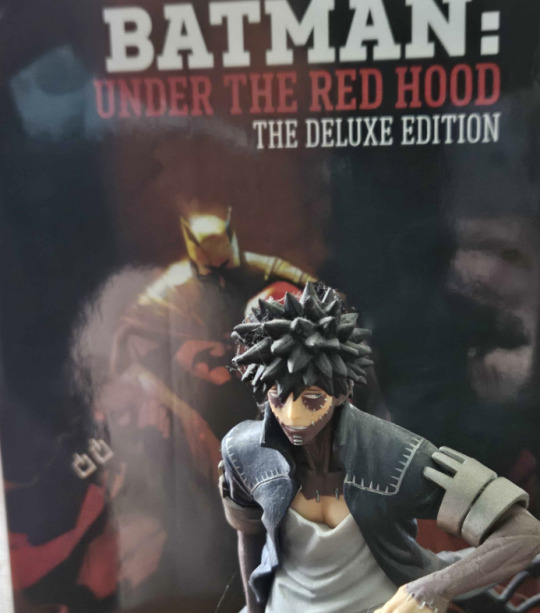
I reread the entirety of the fourteen chapter plotline and the majority of internal narrations come from characters outside of Bruce observing his behavior and commenting on how differently he's acting. Jason's backstory for instance is told by Alfred, not Bruce. Dick Grayson the first Robin comments on Batman's odd behavior. The rest are the third person narrator. Bruce has four instances of internal monologues spanning a few pages each in a 378 page story. (Alfred has the most internal monologues and he's presented as a more trustworthy unbiased narrator than Bruce, to get us to question Bruce's actions).
"Information travels on many routes, sometimes it comes predictably like the tides. You just need to know where to stand and meet it. Other times it's elusive and you have to root through the garbage to find it. In the last few years I've come to rely on Barbara Gordon, Oracle, we all did. Utilizing every form of surveillance equipment she has been the eyes and ear [...] but those days are over. I can't rely on anyone anymore. [...] and tonight it's also about the company I keep. It's different with him [night wing] out here. I think about when he was younger, when I was younger, it was different, simpler and I miss it. I miss those days, for that it's hard to be around him.
This first internal monologue is a case of unreliable narrator, because as soon as finishing it Dick Grayson / Nightwing shows up, offers Batman his help and while Bruce at first refuses it the two of them are forced to work together to fight Amazo. What does this show us? Bruce is not alone, but Bruce actively acts like he's alone ignoring the feelings of the other people around him. It exhibits a flaw of Bruce and the bad headspace he is in mentally (if I remember correctly Stephanie Brown recently died in the comics while this storyline was being published. It establishes Bruce's improper coping mechanism with grief, and how he is going about it the incorrect way.
Bruce says I work alone, and then Bruce says it's easier working with Dick, I miss it, but I can't go back to those days. It's bruce's contradictory thinking patterns in the same chapter that stop him. it's bruce's fault he cannot connect to Dick, and he is actively mourning the past because his relationship with Dick has changed.
Now the final part of the monologue in that chapter.
He's quick. Not just fast, agile. He's not thinking about his next move, he's just making it. He's been trained well. And there's something about him. Something familiar. There was something interesting about before he cut the line, before it had been taught. That had to have been practiced. Either that or just plain dumb luck. No it's not luck.
This is the first hint that Bruce already suspects it's Jason from early on but is in denial about it. This unreliable narrator trope also gives an agency to Bruce's decision, he is actively choosing to ignore the possibility that it's Jason because it doesn't want it to be.
Whereas, a lot of Endeavor's plot takes away any agency from him. For example, he doesn't even know that Dabi is Toya, because if he had the sneaking suspicion and ignored it like Batman did that might have made him look bad. We can't have the main character in a tragedy looking bad now can we?
The second monologue is more denial.
That device is from Kord industries. I should know. Ordered it special from them. How can he have it? No more dead ends. No more questions. No more guessing. Tonight I find out what is passing for the truth.
Reading between the lines this is outright confirmation Batman already knows.
The third is a brief reflection in his feelings for Jason.
The armor has to be light enough to fit but strong enough to protect. But sometimes a great many times, it's not strong enough. It wans't strong enough for Barbara who has to fight from her chair. It wasn't strong enough for Stephanie, other dear soldier enough dear grave. And it wasn't enough for Jason. Willful Jason. Who ignored the danger. Who spat at risk. Who was never frightened enough. I've always wondered... always... was he scared at the end? Was he praying I'd come save him? And in those last moments when he knew that I wouldn't. Did he hate me for it?
This monologue directly shows without stating it outright, Bruce is prioritizing his feelings of grief and failure mixing them in with his genuine grief over the loss of a son. it's selfish of him, but grief is a selfish emotion.
Here's the thing Bruce is allowed to be selfish and to not have the correct reaction to his grief, because the whole story is centered on Bruce being unable to get his shit together in time, and this picture into his emotions is an explanation as to why. Bruce is afraid of being hated by Jason. Jason of course has every right to hate him for failing as a father, but still I think not wanting to be hated to a person you loved so much and feel genuinely sorry over what you let happen to them is an understandable reaction.
Meanwhile we have Enji saying repeatedly all the right things in his monologue, the selfless, I don't need to be forgiven, it's okay if they hate me, I just need to atone but he never actually does anything. There's no explanation for why he isn't doing anything either, so that narrative dissonance. We're shown why Bruce doesn't act in time, he's internally a mess to be frank. We are not shown why Enji doesn't act in time because his internal monologue tells us again and again he's committed to atoning and he understands what the right thing to do is.
As Codenamesanzanka says:
Enji is still saying all the right things, but the story isn't giving him the opportunity to actually do the right things. To have his new actions matter. I have no doubt about his sincerity in his mantra, but without the 'show', it's hollow. Similarly, "Let's talk" is actually kinda bullshit too, because it's so vague. This is less about Enji, and more about the writing, how it set up this scene. "Let's talk" or "I want to talk" or any of that variation is repeated 6 times, without anything more or specific added.
There's an excess of repetition of Enji saying he wants to atone, he's ready to atone, without any of that materializing in the story.
As @class1akids says in this reaction post:
It also feels also super-hollow to say he's sheltering the family from the fallout, after they've just talked about how Fuyumi lost her job (and got a new one through the connections she herself built). How is he going to do that?
The fourth because I don't want to write it down, it's just Batman monologueing on how his partnership with Jason is still good and explaining the technical details of his fight with count Vertigo. It's in chapter 10 if you must look it up.
So four monologues total. Two monologues establish indirectly that Batman knows that Red Hood is Jason and doesn't want to face him. The third monologue establishes why he doesn't want to face him, he's afraid of being hated. The monologue is in line with Bruce's actions in the story, Bruce investigates several ways of reviving from the dead instead of looking for Jason.
The character's reactions around Bruce are also talking about how he's not acting like himself. Especially Alfred's who speaks of Bruce's indecision, on whether to put a stop to or save Jason.
"It is curious. He is lost in thought. It is not like him to spend vast stretches of time immobile, where his mind is gripped in the solitary process of deduction. This is quite different. He is hesitating. At a loss for what to do. I believe it is about Jason. And whether or not to stop him or save him."
This is illustrated in two scenes later where Jason spends a long time simply watching when Jason is fighting enemies, first in a fight against Captain Nazi, and second Black Mask. Jason even gives a direct callout of that behavior.
Jason: What the hell took you so long? Couldn't decide if you wanted to let me live. Batman: Shut up and fight.
Observed by Alfred Bruce is completely stalling and can't choose, observed by Jason Bruce can't decide whether to let Jason live or not. Bruce hesitates twice. We know why. We see it in action. It's called out as flawed behavior.
Now let's cover all the tell that don't show that is Endeavor's many monologues.
Pro Hero Arc:
I have to safeguard the future for them. That's the job for whoever's on top. What about the lives I cut short? Just demanding forgiveness isn't enough, it's too late for that. At this point I need to atone there's no other route.
Hellish Todoroki Family 1:
I'm trying to make ammends going forward. It might be too late. but I fall asleep every night thinking about it. Lately it's been the same dream. The wife and the kids looking happy at the dinner table. But I'm never there with them. It might be too late but I fall asleep every night thinking about what I can do for my family. I wish you could be here too, Toya. It's always the same dream. My whole family's there but not me. If I really care how they feel [I'll remain here].
I'm not going to read 200 chapters so I'm just going to ballpark it based on memory. Here we go.
Dabi's Dance:
My eldest, Toya didn't harbor frost within him. He didn't have a way to overcome the inescapable downside of overheating but I nevertheless sought to raise the boy as a hero. [...] Because Toya had more potential than me I placed my ambitions on his shoulders. I thought it could be you. You could have been the one to reach my eternal goal. My frustration... My envy... The ugliness in my heart... you could have been the one to smash it all to dust.
Plot twist this is the only monologue I like. It's different from all the others, and it's the only one where Enji is being emotionally honest. He put the emotional burden of his own emotional insecurities on an eight year old child, and expected to live vicariously through him and when Toya failed to live up to those expectations he just abandoned him. It alligns what we have been shown so far, Enji is not acting like a reptentant man here who realizes the harm he's done to Toya and only thinks of Toya as an extension of himself and his own regrets.
The Fight Against AFO:
My mistakes took the form as Toya leading to many stolen futures. The past never dies. Rage, resentment and even penace wound together toward the future. And the future is a path for the young. A path with so many branching choices. That's why I must win this. [I'll keep paying my penance. I'll win today and keep my eyes on Toya.]
When Enji decides to double Suicide with Toya:
I take full responsibility. I swore to bear the burden and live my life atoning for it all. However, you've been watching me all this time. While I couldn't be there to watch you. You were someone I especially needed to do right by. No I can't let you meet your end alone, but I won't let anyone else get caught up in our tragedy.
Hellish Todoroki Family Final:
I came to talk about what's to come. I'm retiring as a hero. That was my initial plan even before the war started, but now I can't even walk on my own. The hero endeavor burned to death. Your flames were really stronger than mine. [...] You're right. You know everything about me, Toya. After all you were always watching me. And you wanted me to do the same for you, but I didn't. Not matter what anyone says your heat does come from my hellflame. From now on I'll come everyday, so let's talk. It's too late now, so let's talk. [...] You're free to hate me. Anything is fine really, so throw it all at me.
This one is spoken dialogue but it's still a four-page long monologue. Every one of Enji's monologues with one exceptionsays the same thing: I'm sorry, I'll spend the rest of my life atoning for my actions.
We're repeatedly told Enji is atoning but he acts like Batman. Then, his actions should be framed as Batman, not atoning but avoiding any responsibility.
As observed by Class1akids when we were discussing the update:
Everyone else faces an uphill struggle with their lives, but we should all feel sorry for Enji atoning and being in hell. I hate Hori's compulsion to over-write his abusers and over-explain their atonement. He does this with Bakugou too but with Enji it's more irritating. It was so much more enjoyable when he just wrote the thing but didn't point at them and say -> look, they are atoning. Aren't they soooo cool??
Enji's internal monologues and the other characters frame him as some sort of martyr, while on the other hand it's clear by both Batman's actions and Alfred's observations he's not acting like his usual self. In fact, this is an interpretation of Under the Red Hood that I love from the writers of the video game Arkham Knight that does a less tragic retelling of Under the Red Hood:
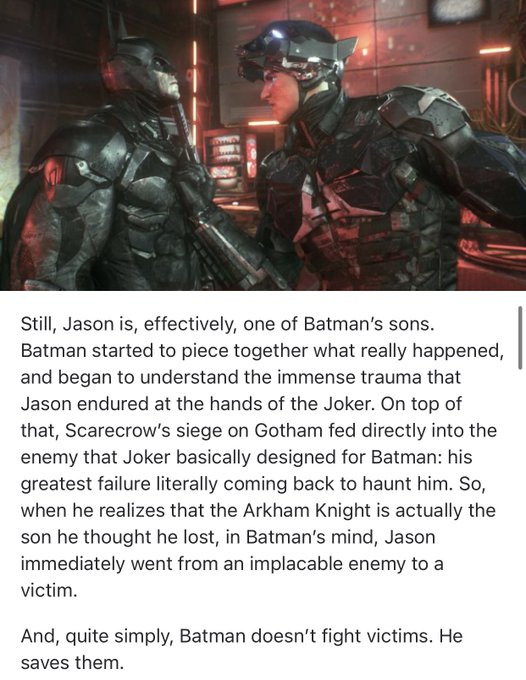
Batman doesn't fight victims. He saves them.
Therefore if Batman is fighting Jason, a victim, he's not acting like Batman. I'm also fine with Arkham Knight being an Under the Red Hood retelling because it's a different story. Comics do this all the time, different universe versions, popular storylines adapted into different mediums. It also works as a commentary on the original story, by showing what Batman could have done to lead to a more positive outcome it makes Batman's choices in Under the Red Hood worse and more tragic because he could have saved Jason, there was still a chance.
So here we have two flawed tragic heroes who are meant to be both pitied and condemned for their actions. One of them is all pity with no condemnation. The other is both pity and condemnation, Batman is grieving, but also he's failing his responsibility towards Jason. Therefore one protagonist works, the other fails utterly.
I'm not saying abusers don't deserve redemption. I'm not saying Enji should have died in order to atone. I'm not saying that the underlying problem with the arc is that they decided to make Enji sympathetic and a focus of the arc. The most important problem is the breaking of one of the fundamental rules of storytelling: Show, Don't Tell.
The Tragic Villain
Not only does The Hellish Todoroki Family plotline fail to make Enji a compelling protagonist, it also fails it's biggest victim. Now, these are both stories that end with the hero failing to save their victim. So if both of these stories have the same ending, why am I saying it failed Dabi, but not Jason?
Well, let me explain.
Dabi and Jason are both villains turned victims. The stories themselves are about this ambiguity. How much should the be held responsible for their own choices? If they are actively harming innocent people, then shouldn't they be stopped? Should they be automatically be forgiven just because of the pain and grief they've suffered, even if they've been causing it to others?
Both characters are also reflective of their fathers because they are too being selfish in their grief, they want their grief acknowledged and so are violently lashing out.
Jason and Dabi both make plays at being vigilantes at first, Dabi wants to inherit Stains will, and Jason Todd wants to be a better bat-man by taking control of the drug trade in Gotham and cutting crime down by executing gang heads. However, neither of them are being honest with this and it's shown through their actions, both of them abandon their original plans.
In the final showdown all Toya cares about is facing Enji on the battlefield, and when he's on the brink of death his mind erodes to the point where all he can do is scream for Enji's attention while his flames get hotter and hotter.
Let's take about Jason first and how his narrative treats him a whole lot better and more sympathetically, with more humanity than Batman. Jason is still held responsible for his choices, he is criticized by Bruce for murdering gang leaders and passing it off as justice. He's also blatantly shown to be a hypocrite. My favorite scene from Red Hood: Lost Days, the official UTRH prequel.
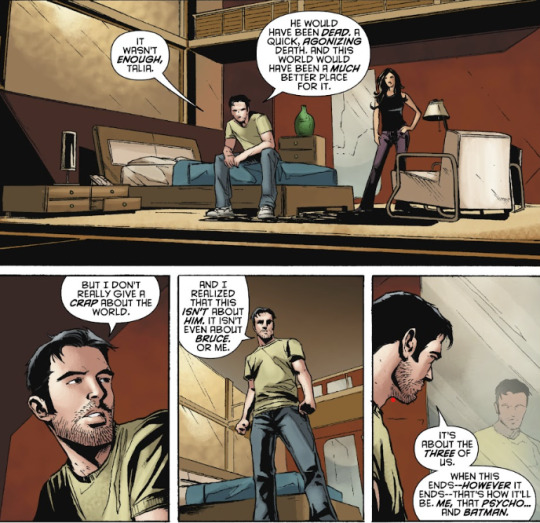
"I want to kill the joker in a cool way. Just sniping the Joker from a rooftop isn't dramatic enough for me."
This scene, and the final scene of UTRH underlines Jason isn't executing criminals because he believes it's the right thing to do, or because of his stated motivation that killing the joker would prevent more future victims.
Instead his every action is to set up a scenario where he makes a selfish demand of Bruce. He wants Bruce to prove to him that he would choose him over being a hero, by setting up his final scenario. Him, the Joker, and Batman. Jason will shoot the Joker. Bruce has a gun. He can either choose to let Jason kill the Joker, or kill Jason to stop him, either way it makes it clear what Bruce's priorities are.
The underlying reason for this is similiar to Bruce. Just like Bruce, Jason is deeply afraid that Batman doesn't love him. That he thinks of him as a failure. (This is Toya's main reason too).
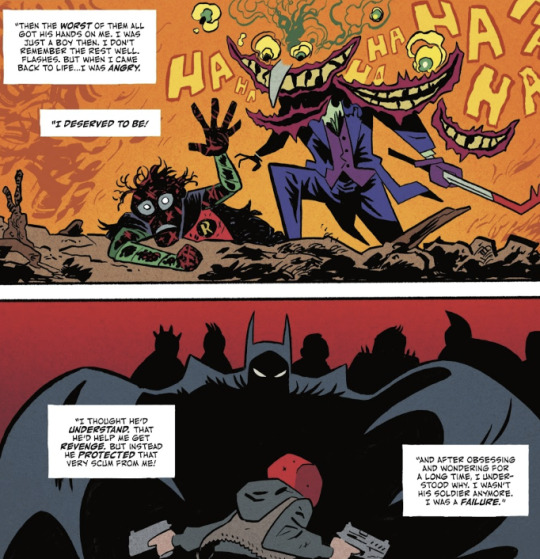
He also interprets Bruce's failure to avenge him to mean that Bruce didn't even care enough to mourn him. If Bruce loved him enough, he'd choose him over the joker, but he's so afraid that Bruce doesn't love him enough that he's going to force Bruce to choose.
Along the way he's also going to behead several crimelords in order to put an exclamation point on that point.
The way Jason completely unravels in the confrontation shows this insecurity, he begins with monologueing about how batman should totally kill people, until his fear that he wasn't important enough, and his grief at losing his father is revealed.
Batman: I know I failed you, but I tried to save you. I'm trying to save you now. Jason: Is that what what you think this is about? Your letting me die. I don't know what clouds your judgement worse, your guilt or your antiquated sense of morality. Bruce, I forgive you for not saving me. Jason: But why on god's green earth is he still alive? Ignoring what he's done in the past. Blindly, stupidly disregarding the whole graveyards he's filled with people. The friend's he's killed. I thought killing me - that I'd be the last person you ever let him hurt. Jason: If it had been you that he beat to a bloody mess. If it had been you he left in agony. If he had taken you from this world. I would have done nothing but search the planet for this pathetic pile of evil, this death worshipping garbage, and sent him off to hell.
Direct statement, it's irresponsible of Bruce to let Joker live after killing Jason and should have put him down to prevent future victims. Reading between the lines, Batman not taking revenge for Jason is a sign that he didn't love him enough, Jason loves Batman more because he would have taken revenge.
As the confrontation continues and Jason's mental spiral worsens, to the point where he can't keep up his pretense of self-righteousness.
Jason: I'm not talking about killing cobblepot, or scarecrow, or riddled, or dent. Jason: I'm talking about him. Just him. And doing it because...he took me away from you.
The father had lost the son, and now the son had lost the father.
Jason's revenge is just a cover, for his grief at losing Bruce. I think this also shows a really positive aspect of Jason's character to humanize him instead of condemning him for his actions to ignore or even justify the suffering he endured: Jason really loves Bruce.
I mean how meaningful is the statement: "Bruce, I forgive you for not saving me."
Bruce has been afraid to hear the whole time that Jason hates him, that he won't forgive him, but Jason loves him deeply. In fact his love is almost equal to his rage because Jason is a deeply emotional person, and these little details make him human and not just like a plot obstacle that Bruce has to face. A metaphor for his past failures.
Dabi is drawn as a crying boy who wants comfort, Jason is shown to be a crying boy who wants comfort through both dialogue and action without us directly needing to be told. It's a heartbreaking line and doing it because he took me away from you and it lands perfectly because the narrative wants us to just look at Jason's grief. It doesn't add an asterisk* even though he was in pain, he's done unforgivable things that can't be justified to undercut Jason's suffering.
In fact that might be another underlying problem with The Hellish Todoroki Family, the narrative tries too hard to make you feel a certain way instead of just presenting things as they are to make you come to your own conclusion. UTRH doesn't support Jason's revenge based serial killing of villains. It doesn't say he's justified to cut off the heads of mobsters. However, it doesn't excessively state "Well, I'm really sorry what happened to you but what you've done can't be forgiven" so we don't have to challenge ourselves to feel too much empathy for Jason's suffering.
Meanwhile even when Toya tries to express his rightful anger and grief, we're always met with someone shutting him down and saying well yeah, but you're wrong, involving innocent people is unforgivable.
As said by @stillness-in-green in the replies to this post:
I think so much harm (in-universe, but the state of the Twitter fandom makes me think the messages are pretty toxic irl, too) comes out of portraying the Heroes as needing to weigh in on the *morality* of the Villains' actions before they gauge "saving" them, when that is not a thing that glorified cops have any business thinking they have the right to do. Demanding repentance before the rehab is so bizarre.
You can say someone's actions are wrong without using it as a factor to consider whether or not their suffering as a human being should be acknowledged, and like I said there's multiple instances of people just yelling at Toya how immoral he is instead of addressing the elephant in the room.
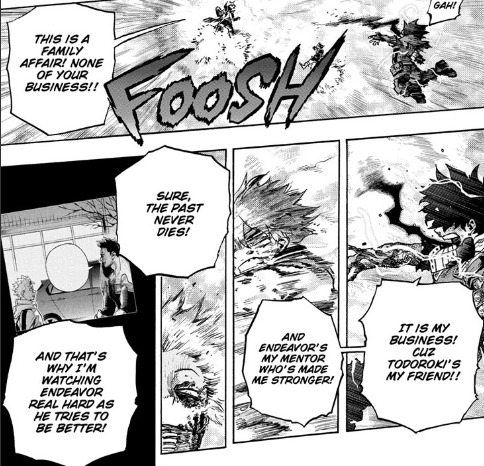
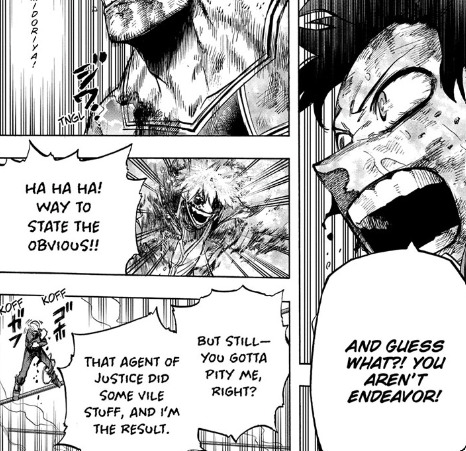
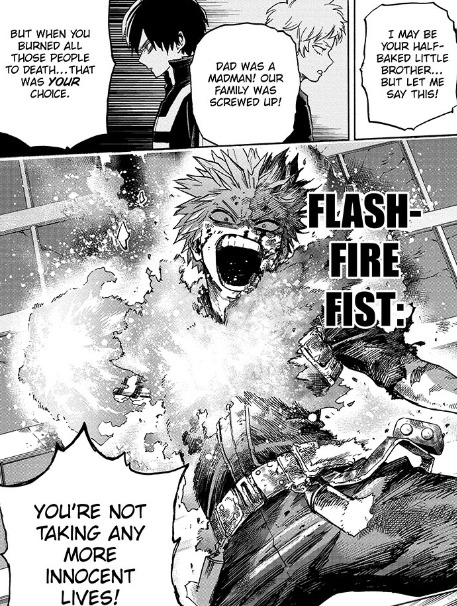
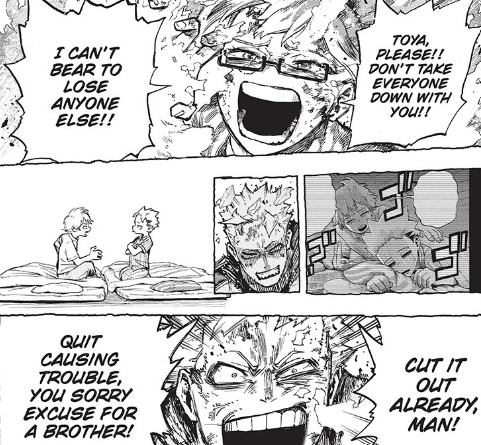
You're wrong, you're wrong, you're wrong, you're wrong.
(Okay, I understand that some people have interpreted this as a show of Honnae and Tatamae, the Todoroki's who are a very repressed household are finally talking about their feelings even if those feelings are selfish and ugly).
(I'm not criticizing Shoto for saying that the people he killed were his own choice necessarily, Shoto is a character who's actions need to be read more deeply than his words he was dedicated to bringing Dabi down without him burning himself any further start to finished. My criticism lies in the fact that Hori uses Shoto as a mouth piece because he thinks we need to be reminded that murder is bad).
However, even acknowledging that time and place man, time and place. They couldn't have done that in the aftermath, when Toya isn't burning to death?
Hey buddy, you're being selfish.
Toya: AHHHHHHHHHHHHHHH I'M MELTING, I'M MELTING.
This is I feel the underlying problem with the way the arc is written, not because the Todorokis are a very traditional Japanese family and there are cultural reasons they express their emotions differently, I'll give a caveat to that it's a nuance I might not understand.
However, I am arguing the actual problem is tell don't show. Horikoshi thinks that we as an audience need to be told multiple times that murder is bad, and we cannot be trusted to interpret that on our own.
Under the Red Hood shows both sides of Batman and Jason's debate, and let's us just come to the conclusion that Jason is in the wrong because revenge isn't justice. Horikoshi reaches no shit sherlock levels of telling us that we're not supposed to approve of Dabi's murders.
it's also a matter of giving Dabi narrative space to express his feelings, like every time Dabi tries to talk he is continually shut down (Shoto does engage Dabi talk to him and listen to why he didn't come back though I'll give him that) and it seems to be to push forward this weird idea that you shouldn't sympathize with the pain Dabi has endured or the ways he's dehumanized unless he does something to prove he deserves to be treated like a human being first.
Jason gets to monologue and make an entire argument, and his argument also shows the depths of his love for Bruce and what a deeply feeling person he is, and how those feelings being hurt and twisted could logically lead to his lashing out.
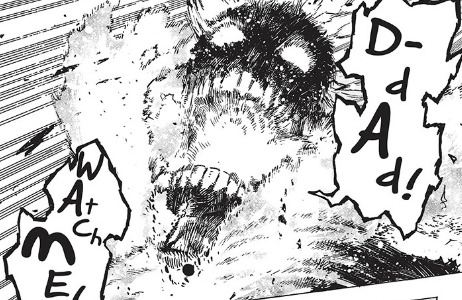
Compare this to Dabi who doesn't get a final monologue, but is instead reduced to a completely mindless state where he just cries out for his dad's attention. He doesn't get to make his argument.
Jason and Dabi both choose to blow themselves up, but Jason gets enough character agency to show this is a deliberate choice he's making even if it's the wrong one. He retains his character agency and ability to make decisions until the end of the narrative.

Jason's also you know physically crying. The end result of the narrative is about wrong choices that both Bruce and Jason make together, and then suffer the consequences together. Bruce watches the same failure play out again and he isn't able to save Jason, Jason doesn't get what he wants, he doesn't get revenge and he doesn't get to reunite with his father. It's tragic for both of them, and brought about by decisions both of them made.
Whereas yes Dabi makes a lot of bad decisions leading up to the last war arc, but in the end his final fate is up to a choice Enji made to not face Toya in the final battle.
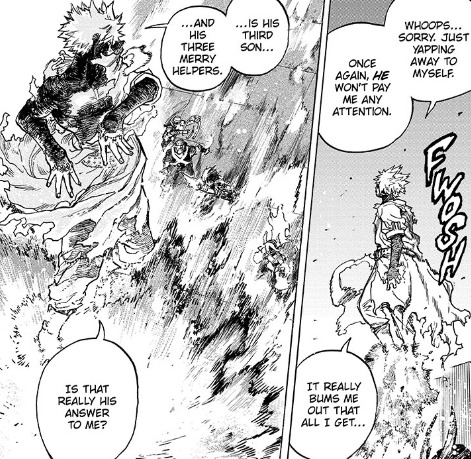
However, while the final consequence of the battle is brought about more by Enji's decisions than Toya's, it's Toya who endures all the suffering and punishment. It's Toya who is in an iron coffin, and doomed to slowly and agonizingly die with all of his skin burnt off unable to move. Toya doesn't even get agency after the arc is over. Enji still has a wheelchair, Enji can still move around, Enji's still fucking rich, he's not in prison for his actions, he as Rei wheeling him around.
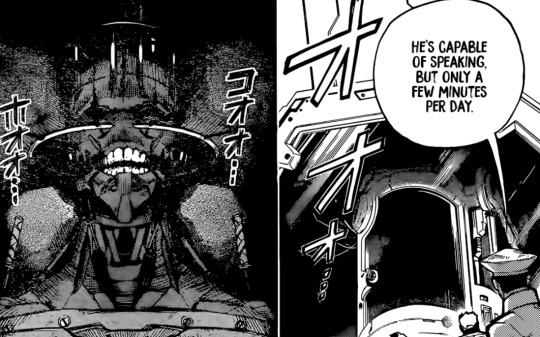
Toya's agency and choices are all taken from him, presumably to serve the plot purpose of making Enji save him to finish off his arc, and then ENJI DOESN'T EVEN SAVE HIM.
Also I think it's important to mention, Bruce's tragic ending is brought about by him attempting to save both, trying to save the joker and Jason with the same action. Whereas Enji's tragic ending is brought about by Enji NOT LIFTING A FUCKING FINGER TO HELP. Yet, it's Dabi who has the lion's share of suffering, and is sentenced to this horrific state of being skinless in an iron coffin and only being able to be awake a few minutes a day with no choice but to waste away.
Bruce is also immediately called out for his actions, by the Joker of all people, you handled this all wrong, it's your fault. Bruce is right to not kill the joker, killing the Joker would not have solved any of Jason's problems, but the fact that he put off facing Jason for so long, and his inability to communicate that he loves Jason is what leads to Jason thinking that the only way to prove Bruce loves him is to force him to choose. It's because Bruce has utterly failed to show him in any other way that he is loved.
Joker: Oh my god, I love it! You manage to find a way to win, and everyone still loses. I'm going to be the one who gets what he wants tonight, badda bing, badda boom."
I'd also like to add that a lot of agency in Enji's actions are taken away too, to make him look more blameless. It's not Enji's fault that he didn't say anything to Dabi during Dabi's dance, he passed out because he had a punctured lung. It's not Enji's fault that he spent a month protecting Deku instead of searching for Toya, he had to protect innocent people. It's not Enji's fault that he didn't go immediately to face Toya in the final war arc Hawks told him not to.
It's not Enji's fault that he made Shoto and Toya fight like Pokemon instead of cleaning up his own mess, and also he feels really sorry for it and as soon as he's done punching the bad guy he'll look after Toya he promises.
Enji does get called out for this behavior but it falls flat because it only comes from the villain AFO, and Toya himself. As I stated above too, the ending is more influenced by Enji's actions not Toya's (because Toya's agency is stripped away until he's mindless) but Toya is the one who has to die while Enji gets to live and atone.
That is the real sticking point for The Hellish Todoroki Family, the way it ends.
Themes Are For Eight Graders
The underlying problem with the whole arc and why The Hellish Todoroki Family fails as a tragedy, is because it wasn't written to be a tragedy.
The above quote is from an interview with the writers of the widely hated Game of Thrones Season 8, which took a sudden tragic turn for Dany's character, gave her an incredibly dehumanizing ending of being put down like a rabid dog by her own lover, an ending that was neither foreshadowed nor did it match with anything written before.
In this meta here by @hamliet it goes far more into depth that Game of Thrones isn't a tragedy, but a piece of Romantic fiction (not a love story, Romanticism is a genre of big emotions, the beauty of life, larger than life ideas hence why it fits well with fantasy genre, it can be sad but it doesn't follow tragic structure).
Dany is a romantic heroine, a deconstruction of the idea of the classic warrior princess trope, and you know a colonizer, but she's not meant to be written as an inherently bad person. There are people who say that Dany was going to die in the original books. I'm one of those people. Me. However, context and framing matters, Dany for all her colonizing ways does genuinely want to do the right thing, so it's likely she'd die a heroic death as a reflection of her selfless intentions (and intentions do matter for fictional characters) whereas in the show she's put down as a villain.
Now watch me I'm going to coin a term for future literary critics to use: Narrative Gaslighting.
Narrative gaslighting is different then Show Don't Tell, where an author has just failed to properly show what they're trying to tell you in the story. Narrative Gaslighting is when a narrative deliberately tries to mislead you, straight up lies to you, or just insists things that did not happen totally happened guys. Much like real gaslighting, Narrative Gaslighting makes you feel stupid for interpreting things a certain way and insists you were wrong all along.
Narrative gaslighting is when Tyrian gives a speech that everyone should have suspected Dany when she burned slavers alive that she was secretly evil and would one day turn on them.
Like, no.
Dany is flawed because she is a foreigner, interfering with the politics of a different country that she does not understand in order to gain enough resources and men to return to her home country and invade that country to exercise her right as a Targeryn to uphold the divine right of kings.
Game of Thrones doesn't mention any of that shit that's in alignment with the previous actions in the story, it's just insisting the very ableist notion that Dany was insane all along and her violence towards other people is the result of her mental illness.
(Also before anyone says, so if she's a colonizer than how can she have good intentions, everyone is Bad in Game of Thrones, they're all waging war to vie for a throne, monarchy is bad guys. IDK how to tell you that Game of Thrones has gray on gray on gray on gray morality).
(Also this aside ties into the hangup of MHA and most popular fandom culture on Twitter, that Dany's moral failings somehow disqualify her from her humanity. In spite of the fact that on top of all of that she's a rape victim, and like, Dany's only on that continent in the first place because she was sold as a bride.)
But here's the same weird subtext that Horikoshi's writing of Dabi. The fact that Dabi was continually victimized and denied human dignity does not need to be addressed, because he did the bad things and didn't atone properly enough for it first.
In essence this random post on the gunnerkrigg court forums I found on the same day the chapter came out, displaying apollo's gift of prophecy.
"When someone is persecuted, it's important to inform everyone about their flaws. That way you don't have to feel anything about all the times that they were denied human dignity."
So, Dany is not written as a tragic hero but a romantic one, we as an audience are both meant to acknowledge her flaws and sympathize with her, not demonize her in an ableist way for being insane, and even if Dany is meant to die the tragic way she dies does not match up with all of the narrative foreshadowing that was built before that.
Like, for instance a lot of POC after the show ended kept telling everyone that Dany's actions in a foreign country were seriously problematic, and not only did the audience not listen but the showwiters didn't acknowledge it with the same subtlety as the books. So those people especially were able to pick up Dany's character flaws, and when the show finally acknowledged them it's not even in the way that critiques of the show were pointing out Dany's flaws it was just "she was insane all along." Not like taking time to go "no matter what the intention, interfering with the politics of a foreign country is wrong."
The problem with the Todoroki arc is essentially the same, down to the ableism (because outsiders continually call Dabi either a maniac or insane Demon without even giving credence to his grievances about hero society he's just reduced to an insane fringe element of society, and Dabi himself is reduced to a completely mindless, childish, insane screaming state where he can't make active decisions).
The Todoroki Arc is not set up to us as a tragic one. The ending is pretty clearly telegraphed to the whole audience. People are not wrong for thinking that Toya's ending would be either rehabilitation like Rei with the eventual hope of being welcomed home, or some kind of house arrest where he still gets to be with his family.
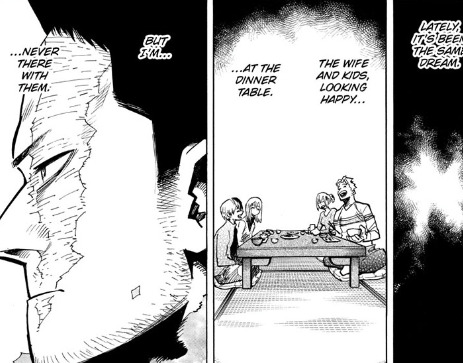
Everyone happy at the Dinner table and Enji not sitting with them.
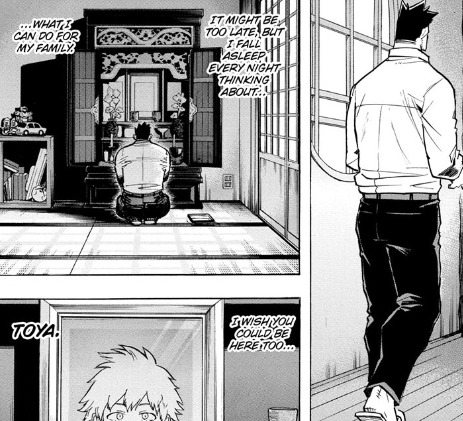
"I wish you could be here, Toya."
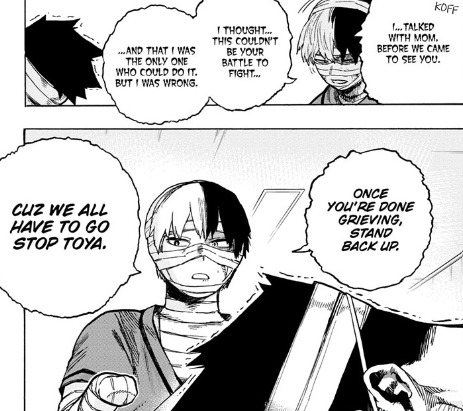
"We all have to go stop, Toya."
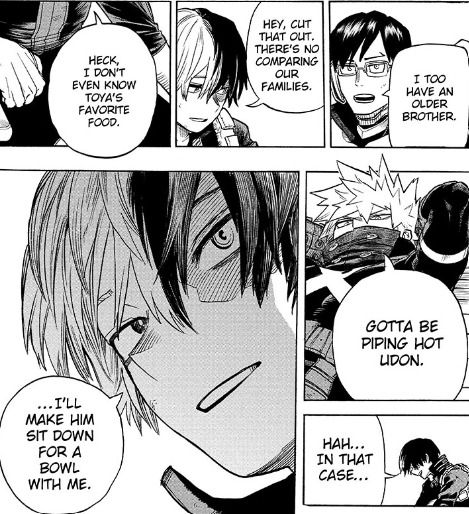
"In that case, I'll make him sit down for a bowl with me."
Even Shoto's efforts to take down Toya non-lethally are rendered completely pointless, because Toya gets back up again and then burns himself alive (completely by his own choice so no one has to feel bad that they failed).
The story sets up the expectation that Toya is going to be brought home and sit down for a meal with his family. Then it makes you feel stupid for going in an entirely different direction. It was always going to end this way didn't you know The Todorokis are a tragedy?
Well, I just spent a very long section of this thesis statement illustrating that if it's supposed to be a tragedy, then it's still not written well.
It's a written as a romantic story of a family healing, and the villain getting saved, only for the villain not to be saved and the story to just keep on going like not getting saved isn't a huge failure. This is something that should permanently destroy the main characters, that they got the chance to repeat Sekoto peak and be there this time and they all utterly failed. I feel bad for Shoto most of all because he did everything right, and he still loses his brother, but does the story show that?
The problem is the story is blatantly lying to you about the fact that Toya was somehow saved, even though he LITERALLY LOOKS LIKE HELLRAISER. To quote Codenamesanzanka again:
But I feel the story couldn't give us that because it will remind the reader and everyone just how much Touya will be missing. In-story, talking any more will overburden Touya's heart - and how apt is that metaphor? So let's talk about how we'll talk, but that's all that's allowed here for this scene. Else we'll see how unfair it is that Touya has to be confined to this room, he isn't with his family and they have to come to this prison just to tell him about their day, and soon he will be gone. Details make it real, and it would've exposed the lie that Touya was saved in an actual way. The story knows it too - "this extra time Shouto gave us." This is all 'extra', and not the core. [...] If the story was sincere that this is a case of "it's simply too late" - as it should be!!! imo, to really drive in the clear point that they failed, they did not get the save they wanted, because that's the truth - the tone of the chapter isn't tragic enough for that. The tone is going for 'Making Peace With This'. We've skipped the stages of grief and all we have is acceptance. The characters have accepted this, and so must the readers as well.
Therefore it's narrative gaslighting, the story is making us doubt our perceptions and trying instead to manipulate us to feel a certain way. We don't have to question the unfairness of Toya's fate, because look at all the people he's hurt, and look how Enji is atoning and taking responsibility.
The story builds up the idea that Enji will choose Toya. That he will choose being a father over being a hero. Enji doesn't do that, and it's Toya who suffers the horrific, painful consequences while Enji gets off mostly scott free. Mind you it's also ableist to suggest that being in a wheelchair is some sort of life-ending consequence like he's fine. The story even goes out of its way to say how avoidable this ending could have been if Enji or Rei or someone lifted a single finger to give Toya the acknowledgement he wanted, and then gives it a "Too little, Too Late" conclusion but doesn't acknowledge that this is where it's ending and instead tells us that Enji has successfully atoned.
"Everyone's watching me. So this is what it's like. If it was such a simple thing, then why not sooner?"
If it was going to turn out this way Toya should have just died here, not because death would somehow be a mercy compared to life in prison, but because the Todoroki Family doesn't deserve to get to pat themselves on the back. If they let Sekoto Peak happen a second time, then they should have to deal with the consequences of that.
It would be consistent is my point. This is written as a "Too Little, Too Late" kind of ending, but we don't get the emotional response from the Todorokis that they've let Toya die a second time.
On the other hand, UTRH has the exact same tragic ending but it doesn't make me angry because it's honest about it. The Todorokis let Sekoto peak happen a second time. Batman let Death in the Family happen a second time, but look at how even the narration and comic panels of the story acknowledge it.
"Fate is a funny thing. It swells up like a raging current and we are forced to travel. It provides us no exit. No deviation. It drops us in a bottomless ocean and compels us. We either swim, or drown, and sometimes as we struggle against the tide, a great truth arises."
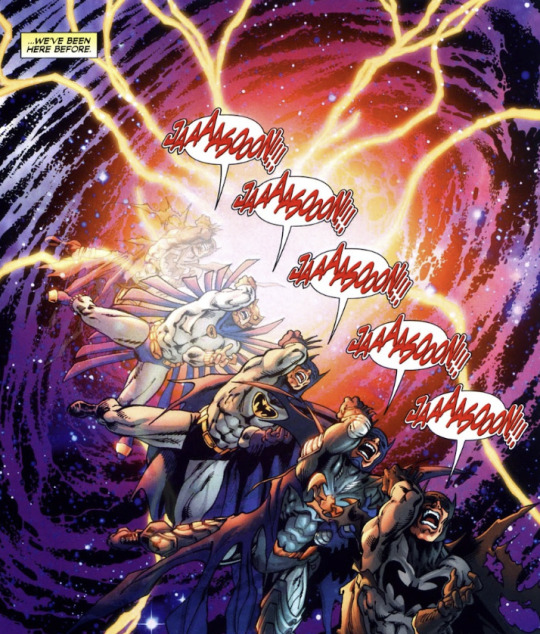
One ends with Enji meaninglessly stating that he'll spend the rest of his life atoning for Toya and watching over him (which I guess will be like two months tops) for the fifth time. The other ends with Batman being lectured by the Joker of all people of how he chose wrong and being forced to watch once again as a warehouse blows up, and he's completely helpless to save Jason.
UTRH ends with the message that Batman sucks, Enji's atonement arc ends with Natsuo calling him cool for atoning and UTRH makes me like Batman way more as a character. Whereas at this point I feel nothing from the Todoroki Family, except for a disgust for the way that Toya not only has to die, but has to die a slow, gruesome death while the rest of his family walks away with the small comfort of "oh at least we'll get to say what we need to say before Toya passes."
Especially with the fact that Toya's greatest fear was that when he died, he died meaninglessly because his family never grieved him and all moved on with their life. I guess we don't have to analyze how gross the underlying message that criminals don't deserve to be sympathized with because themes are for eighth graders.
EPILOGUE
The post is finished but apparently everyone expects me to cover every single possible angle even in posts this long.
You didn't address the cultural aspect. Under the Red Hood is a western story, and Todoroki Family is based on eastern concepts.
The post isn't about that. The post is long enough I can't cover every single topic. Here's someone who covered that topic thoroughly. This one discusses more about the nuances of collectivism.
Also, since the Todoroki Family obviously copied Under the Red Hood's homework, it warrants a comparison. Especially since it seems to critically misunderstand what made the original work.
Which is a valid form of Literary Criticism, as Ursula K Le Guinn once said:
It doesn’t occur to the novice that a genre is a genre because it has a field and focus of its own; its appropriate and particular tools, rules, and techniques for handling the material; its traditions; and its experienced, appreciative readers—that it is, in fact, a literature. Ignoring all this, our novice is just about to reinvent the wheel, the space ship, the space alien, and the mad scientist, with cries of innocent wonder. The cries will not be echoed by the readers. Readers familiar with that genre have met the space ship, the alien, and the mad scientist before. They know more about them than the writer does.
The Todorkis aren't all to blame for Toya. Natsu, Fuyumi and Shoto are innocent:
You're right. It's just easier to refer them as the Todorokis then specifying "Enji and Rei" each time.
You didn't mention Shoto once in this post:
I have no cricism for Shoto's role in all this. In fact I think he's the best written part. I praise it here.
Shoto is a good boy, and he deserved to spend more time with his brother. The fact he won't be able to sit down and have dinner of him, is the greatest tragedy of them all.
#mha meta#mha spoilers#mha 426#mha 426 spoilers#shoto todoroki#dabi#toya todoroki#enji todoroki#under the red hood#jason todd#bruce wayne#batman#mha critical#todoroki family
624 notes
·
View notes